
Apple Unveils Vision Pro VR Headset; First Major Product in Decade
-


WATCH: Judge, Fani Willis Prosecutor Get Into Heated Argument in Court
-


Tucker Carlson Interviews Telegram Founder Pavel Durov
-


WATCH: Florida Police Have Zero Tolerance for Anti-Israel Activists Blocking Streets
-


VIDEO: Student Charged After Slapping Female Teacher in Profanity-Filled Classroom Tantrum
Apple announced its mixed-reality headset, the Vision Pro, on Monday during its WWDC developer conference. The $3,499 headset is its first major new product since the Apple Watch in 2014.
The Vision Pro will allow users to see apps in a new way, in the spaces around them. Users can use their eyes and hands to navigate through apps and search with their voices. The headset can be used to watch movies, including in 3-D, with spatial audio, view their own pictures or videos, and play video games. It can also be used for work with video conferencing apps, Microsoft Office tools or Adobe Lightroom.
It will be available starting at $3,499 beginning early next year.
Apple stock dropped about 1% after the company unveiled the headset, giving up gains from earlier in the day.
With a feature called EyeSight, the headset can become transparent or opaque to signal to people around the headset user if they’re immersed in an experience or available to interact. Spatial audio will make it feel like the user is totally immersed in the experience, including by sensing other items in the room.
The Vision Pro can also create a realistic-looking avatar of a user to use in the experience.
The headset is made to fit different face shapes and sizes with adjustable and interchangeable parts.
The company announced several partnerships for the Vision Pro on stage. Disney CEO Bob Iger appeared on stage to announce that Disney+ would be available on the Vision Pro from day one of its release. Unity stock spiked over 20% and trading was briefly halted after Apple announced a partnership with the game development platform.
Here is a video from Apple’s presentation that shows how it works:
Apple has worked on headset hardware and software since at least 2016 in a division called the Technology Development Group. Monday’s launch is the culmination of years of development — some in secret, and some as public-facing groundwork previously released for the iPhone, such as depth-sensing cameras and software.
Apple CEO Tim Cook has spoken at length about the potential of augmented reality that overlays computer graphics onto the real world, saying that the tech could eventually be an everyday device for most people and that its impact could be similar to the invention of the internet.
Apple’s VR headset debut comes during a time when the broader virtual reality industry has struggled to meet high expectations for the technology. For now, it’s considered to be “mixed reality,” or virtual reality that can access the outside world through cameras mounted on the headset.
Monday’s launch also opens up a new era of open competition between Apple and Meta, which develops its own virtual reality headsets. Meta said last week that its latest headset model, Quest 3, would be released later this year.
How Google Glass Experiment Exposed the Antisocial Nature of Face Wearables

News
US and Chinese Scientists Are Working in China to Develop New Deadly Viruses

Lawmakers are demanding answers after it was revealed the US is sending taxpayer dollars to a Chinese army lab to make bird flu viruses more dangerous to people.
Eighteen members of Congress are demanding answers from the Department of Agriculture (USDA) about the project, which was first revealed by DailyMail.com.
It is part of a $1million collaboration between the USDA and the CCP-run Chinese Academy of Sciences – the institution that oversees the Wuhan lab at the center of the Covid lab-leak theory.
In a scathing letter to USDA Secretary Tom Vilsack last week, the bipartisan group said: ‘This research, funded by American taxpayers, could potentially generate dangerous new lab-created virus strains that threaten our national security and public health.’
The research comes as fears about bird flu rise. A farm worker in Texas caught the H5N1 strain that is racing through cattle across the US earlier this month, becoming only the second ever American to be diagnosed – and experts are bracing for more cases.
In February, it was revealed the United States government was funneling $1million to China to see if scientists could make ‘highly pathogenic avian influenza’ more contagious to mammals using gain-of-function research.
Government records showed the collaboration began in April 2021 and is scheduled to be funded through March 2026. The USDA previously told this website the project was applied for in 2019 and approved in 2020.
The research involves infecting ducks and geese with different strains of viruses to make them more infectious, and studying the viruses’ potential to ‘jump into mammalian hosts,’ according to research documents obtained by the watchdog group White Coat Waste Project and shared exclusively with this website.
It is being funded through the USDA and the main collaborators on the project are USDA Southeast Poultry Research Laboratory, the Chinese Academy of Sciences and the University of Edinburgh’s Roslin Institute – a Wuhan lab partner.
And it has been ongoing despite similar research being restricted in 2022 and growing concerns that dubious Chinese studies may have started the Covid pandemic.
Just yesterday, President Joe Biden’s administration announced it will work with 50 countries to identify and respond to infectious diseases, with the goal of preventing a pandemic that the US’ own research could actually spark.
Last week’s letter was spearheaded by Rep Nick Langworthy, a Republican from New York who serves on the House Agriculture Committee.
It states: ‘We are disturbed by recent reports about the US Department of Agriculture’s (USDA) collaboration with the Chinese Communist Party (CCP)-linked Chinese Academy of Sciences (CAS) on bird flu research.’
The CAS is the parent organization of WIV and has previously been prohibited from receiving US government money for ‘blatantly violating grant and biosafety policies, refusing to share lab notebooks and other data, and otherwise obstructing investigations into the likely role of the lab’s risky coronavirus [gain of function] research in the origin of Covid-19.’
The letter continued: ‘Recognizing the problematic behavior of CAS, our House and Senate colleagues have called for sanctions against CAS and its affiliates and for taxpayer funding to be cut for all research involving CAS.’
The signatories then requested written answers to seven questions inquiring about the potential of the research to increase transmissibility of bird flu viruses, details about specific experiments being performed, the biosafety levels of the experiments, what oversight the USDA is providing over CAS and if the FBI performed a safety risk assessment on the collaboration – and, if so, what those results were.
Bird flu is of particular concern right now because a farmer in Texas recently contracted the H5N1 strain of the virus.
The patient caught the bird flu from an infected cow, which was the first time the strain had been found in cattle.
They are only the second person to contract H5N1 after someone in Colorado caught the virus in 2022.
While there is no sign of person-to-person spread — a development that would signal the start of a human epidemic — experts say the ease with which the strain is jumping between species raises the risk of it evolving to infect people more easily.
The Centers for Disease Control and Prevention report a ‘low’ public health risk.
The virus, however, is widespread in wild birds, with sporadic infections in poultry and mammals.
Experts have previously told DailyMail.com H5N1 has the potential to spark a new pandemic.
Dr Aaron Glatt, an infectious diseases expert at Mount Sinai in New York, warned: ‘It is absolutely true that H5N1 has the potential to cause a pandemic.
‘People who work with these animals do need to be careful.
‘The more that this virus is spread, the more likely it is that it could become a strain that could mutate and start to spread from human-to-human.’
The H5N1 spreading across the world emerged in 2020 after a bird was infected with both a bird flu from domestic poultry and a virus from wild birds.
During the infection, the two viruses met in the same cell and swapped genes — in a process scientifically termed re-assortment — to create the new virus that now had multiple attributes that made it better at infecting bird cells.
It quickly spread globally, with the first cases identified in Europe — before infections were also detected in Africa, the Middle East and Asia.
This month’s letter is not the first written to the USDA from lawmakers.
Following February’s investigation, Republican Sen Joni Ernst of Iowa wrote a letter to Sec Vilsack seeking more information about the department’s ongoing funding of the research.
The letter read: ‘I was troubled to learn from the non-profit group White Coat Waste Project that USDA is supporting experiments involving a “highly pathogenic avian influenza virus” that poses a “risk to both animals and humans.”‘
Sen Ernst said in a statement to DailyMail.com at the time: ‘The health and safety of Americans are too important to just wing it, and Biden’s USDA should have had more apprehension before sending any taxpayer dollars to collaborate with [China] on risky avian flu research.
‘They should know by now to suspect “fowl” play when it comes to researchers who have ties to the dangerous Wuhan Lab, and simply switching from bats to birds causes concern that they are creating more pathogens of pandemic potential.
‘Here’s my warning: the Biden administration should be walking on eggshells until they cut off every cent going to our adversaries. We cannot allow what happened in Wuhan to happen again.’
The specific viruses the research said it will study include H5NX, H7N9 and H9N2, WCW reported.
A 2023 study described H5NX viruses as ‘highly pathogenic’ with the ability to cause neurological complications in humans.
The H7N9 strain first infected humans and animals in China in March 2013 and the World Health Organization said it is of concern ‘because most patients have become severely ill.’
The H9N2 strain has been found in doves in China and while it has a lower pathogenicity than the other strains, it can still infect humans.
Despite the concerns, a USDA spokesperson told this website it is ‘common for international researchers to conduct independent research that’s connected to the same end goal’ and that the research does not qualify as gain-of-function.
News
Senate Dems Kill Mayorkas Impeachment Trial
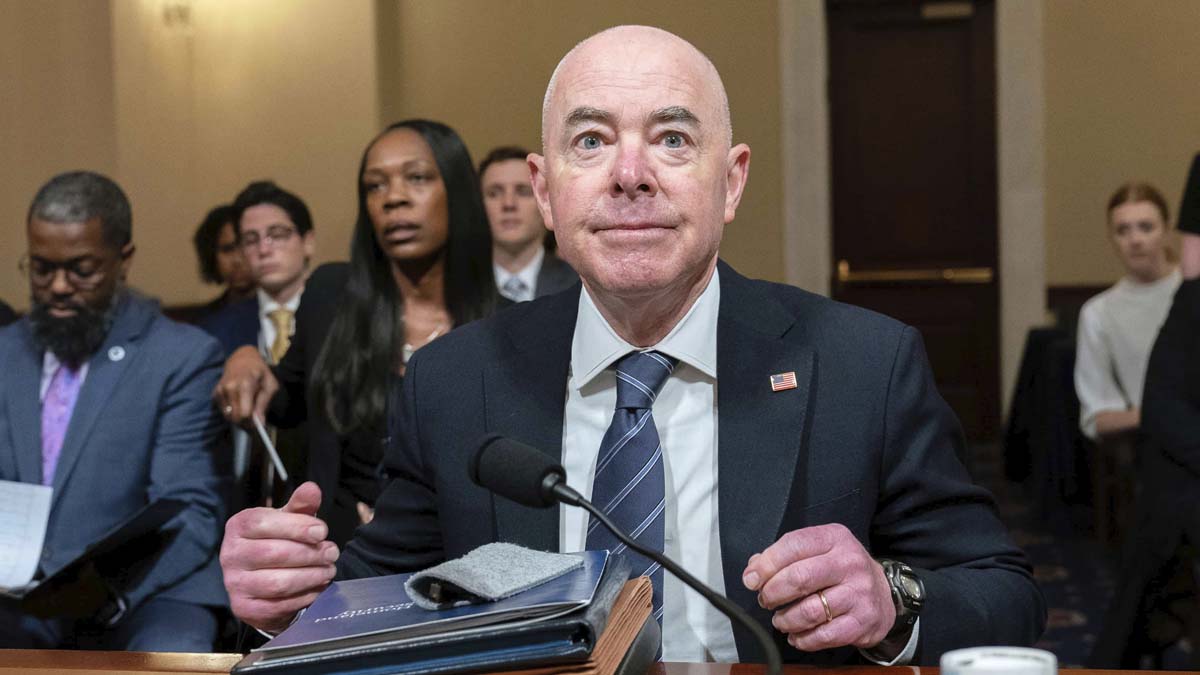
The Senate on Wednesday ended the impeachment trial of Homeland Security Secretary Alejandro Mayorkas, making him the second Cabinet official in history to evade a conviction and removal from office — but the first to be acquitted without evidence being presented of alleged “high crimes and misdemeanors.”
Senate Majority Leader Chuck Schumer (D-NY) convened the upper chamber in the early afternoon to swear in the 51 Democrats or independents who caucus with them and 49 Republicans as jurors, before offering a motion to dismiss the first of the charges without a trial.
The unprecedented move set off a series of objections from Republicans, with Sen. John Kennedy (R-La.) proposing a motion to adjourn the proceedings until April 30 and Senate Minority Leader Mitch McConnell (R-Ky.) rising to oppose Schumer’s point of order that the first impeachment article was “unconstitutional.”
“At this point, in any trial in the country, the prosecution presents the case, the defense does the same and the jury listens,” McConnell said. “But the Senate has not had the opportunity to perform this duty.”
GOP senators brought other objections on the second article, pushing for a closed session, asking to adjourn until after the 2024 election and questioning whether they were setting a precedent of absolving federal officials of potential felonies without a trial.
Senate Minority Whip John Thune (R-SD) also offered a direct challenge to Schumer’s procedural attempt to kill the trial. Each Republican objection fell, with all 51 Democrats voting against them.
Alaska GOP Sen. Lisa Murkowski voted present on the question of dismissing the first article and against dismissing the second, whereas all other members voted on the party line — letting both fall, 51-49.
After nearly two hours of deliberations, Mayorkas became the first impeached government official in US history to dodge a trial, which had followed 21 impeachments for three presidents — including twice-charged former President Donald Trump — a Cabinet secretary, a senator and many federal judges.
“They’re gonna try to sweep this under the rug and act as if the Biden border crisis never existed. But the evidence is very plain,” Sen. John Cornyn predicted to Fox News on Wednesday.
Schumer indicated in a Senate floor speech on Tuesday that he wanted “to address this issue as expeditiously as possible” and that “impeachment should never be used to settle a policy disagreement.”
The House voted 214-213 in February to impeach Mayorkas, 64, for his “willful and systemic refusal to comply” with federal immigration law and lying to Congress about the Biden administration maintaining a “secure” border.
Eleven House impeachment managers, led by Homeland Security chairman Mark Green (R-Tenn.), delivered the two articles of impeachment to the Senate on Tuesday.
The Senate had an obligation to conduct a full trial, hear the evidence, and render a verdict,” Green said in a statement following the Senate vote. “However, just as Secretary Mayorkas has grievously failed in his constitutional duty, now so has the Senate. Instead of addressing the serious charges against Secretary Mayorkas, the upper chamber has chosen to neglect its responsibility.
“This is an unprecedented failure by the Senate to do its duty, which, for the first time in our history, has outright refused to conduct an impeachment trial when given the opportunity to do so,” Green added. “This is not only a tacit approval of Secretary Mayorkas’ assault on our constitutional order, but an insult to the millions of Americans who want to end this crisis and hold accountable those who intentionally created it. Sadly, the Senate has now failed on both fronts.”
“Today’s decision by the Senate to reject House Republicans’ baseless attacks on Secretary Mayorkas proves definitively that there was no evidence or Constitutional grounds to justify impeachment,” DHS spokeswoman Mia Ehrenberg said in a statement.
“As he has done throughout more than 20 years of dedicated public service, Secretary Mayorkas will continue working every day to enforce our laws and protect our country. It’s time for Congressional Republicans to support the Department’s vital mission instead of wasting time playing political games and standing in the way of commonsense, bipartisan border reforms.”
Record-breaking numbers of migrants have crossed illegally into the US every year that Biden has been in office, with a total of more than 9 million encountered at land borders, according to US Customs and Border Protection statistics.
More than 7.5 million migrants have been caught along the southern border, and another 1.8 million have evaded apprehension but nevertheless been observed making the illegal entries.
The massive influx has led to a backlog of more than 3 million cases of asylum seekers in the US, the House impeachment resolution noted.
The impeachment articles also alleged that Mayorkas failed to enforce the Immigration and Nationality Act of 1952 and misled Congress about the Department of Homeland Security having “operational control” of the border.
In a Sept. 30, 2021, memo, the secretary had also changed policies for detaining and expelling migrants, allowing his department to institute a de facto “catch and release” policy for millions of illegal border crossers, the resolution states.
In March 1876, the House impeached Secretary of War William Belknap on charges of corruption, but he handed in his resignation to President Ulysses S. Grant hours before the vote was held.
House managers and more than 40 witnesses argued that Belknap’s resignation shouldn’t keep the upper chamber from voting to convict — but the Senate acquitted him on five articles of impeachment for taking kickbacks in exchange for a political appointment.
News
WATCH: Judge, Fani Willis Prosecutor Get Into Heated Argument in Court
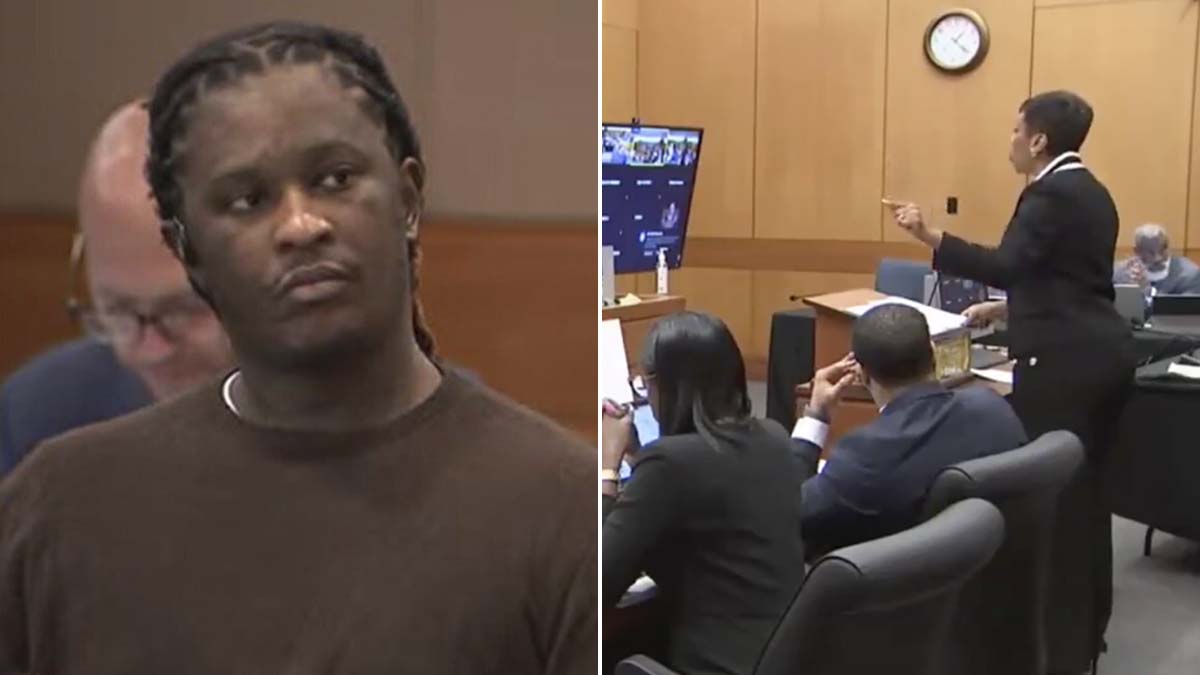
A Georgia prosecutor from Fulton County District Attorney Fanni Willis’ office got into a shouting match Wednesday with the judge overseeing the trial of rapper Young Thug as the pair argued over evidentiary matters.
Chief Deputy District Attorney Adriane Love and Fulton County Judge Ural Glanville got into a heated shouting match when the judge ruled that the evidence Love wanted to introduce would be excluded.
“Why didn’t we file this stuff months ago and let’s wind it out and air it out at that point in time,” Glanville told the defense before asking Love about the matter.
The judge asked Love if prosecutors had discussions about the evidence before excluding the material. As Love began voicing her frustration, Glanville said: “Well then you all should have gotten yourself together beforehand.”
“Have a seat, madam. Have a seat,” he said after telling court officers to summon the jury, which was not present during the exchange. “You better exclude that and next time, make sure you’re prepared.”
Love argued that her team tried discussing the evidence with the defense.
“Oh it’s going to be inadmissible right now,” Glanville replied. “I am not going to have any more discussion about this, madam.”
“Judge, we talked to them this morning about that! And I attempted to talk to them earlier this week!” Love shouted. “Your honor, so the court punishes the state because (of) the defense?”
“I’m not punishing anybody,” the judge replied. “But prior preparation prevents poor performance.”
“We prepared, judge! That’s why I sent them what I sent them last week! A whole week and a half ago! Two weeks, your honor!” Love yelled before Glanville told her the jury was coming into the room.
Watch:
Judge DESTROYS Fani Willis’ Prosecutor – He’s Had Enough!
Watch as Fulton County Assistant District Attorney Adriane Love goes nuts, argues and yells at Judge Ural Glanville when she doesn’t get her way during the YSL trial involving rapper Young Thug.
This should’ve been… pic.twitter.com/rDTrOVCO9e
— Conservative Brief (@ConservBrief) April 17, 2024
Love’s boss, Fani Willis, has garnered national attention for her prosecution of former President Trump for alleged election interference.
Willis was accused of having an “improper” relationship with Nathan Wade, the special counsel she hired to prosecute Trump. She was also accused of financially benefiting from the position Wade held in her office. Both Willis and Wade denied the allegations.
Wade resigned from the case, allowing Willis to stay on it.
Love is the lead prosecutor in the trial against Young Thug, an Atlanta-based hip-hop artist, who’s given name is Jeffery Lamar Williams.
Williams and six others are charged in connection with participating in a criminal street gang responsible for violent crimes. In addition, he is accused of racketeering conspiracy as well as drug and gun charges.
Young Thug achieved tremendous success after starting to rap as a teenager and serves as CEO of his own record label, Young Stoner Life, or YSL. Artists on his record label are considered part of the “Slime Family,” and a compilation album, “Slime Language 2,” rose to No. 1 on the charts in April 2021.
But prosecutors say YSL also stands for Young Slime Life, which they allege is an Atlanta-based violent street gang affiliated with the national Bloods gang and founded by Young Thug and two others in 2012. Prosecutors say people named in the indictment are responsible for violent crimes — including killings, shootings and carjackings — to collect money for the gang, burnish its reputation and expand its power and territory.
News
Biden Claims His Uncle Was Eaten by Cannibals During WWII — But Military Has Different Story
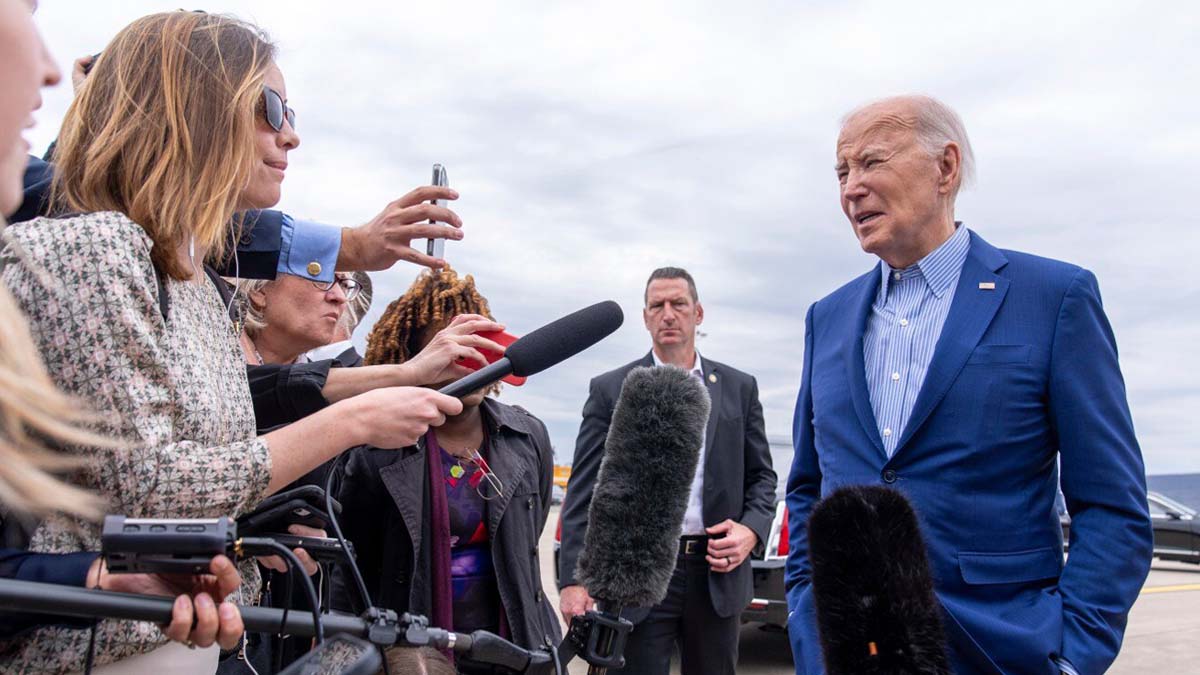
President Joe Biden appeared to suggest that cannibals ate his uncle after he was shot down during World War II, though military records say otherwise.
Speaking with reporters on Wednesday in Scranton, Pennsylvania, Biden twice recalled the story of his uncle, Ambrose Finnegan, who served in the U.S. Army Air Forces in the Pacific theater of World War II.
The president claimed that he was shot down over Papua New Guinea in an area infested with cannibals.
“He flew single-engine planes, reconnaissance flights over New Guinea. He had volunteered because someone couldn’t make it. He got shot down in an area where there were a lot of cannibals in New Guinea at the time,” Biden said.
“They never recovered his body, but the government went back when I went down there, and they checked and found some parts of the plane.”
Watch:
Biden has a new story: Uncle Bosey got shot down in a plane and was possibly eaten by African cannibals. pic.twitter.com/9cSP29GSxx
— End Wokeness (@EndWokeness) April 17, 2024
Biden used the story as a roundabout way to bash Donald Trump, citing a disputed story claiming that the former president refused to visit a cemetery for American soldiers in France because he thought they were “suckers” and “losers.”
Military records contradicted nearly every detail of Biden’s story about his uncle, instead noting that Finnegan’s plane crashed in the ocean due to engine failure.
“For unknown reasons, this plane was forced to ditch in the ocean off the north coast of New Guinea,” a report from the Department of Defense’s POW/MIA Accounting Agency said.
“Both engines failed at low altitude, and the aircraft’s nose hit the water hard. Three men failed to emerge from the sinking wreck and were lost in the crash. One crew member survived and was rescued by a passing barge. An aerial search the next day found no trace of the missing aircraft or the lost crew members.”
The plane was also cited as an A-20 Havoc, a two-engined plane.
In his remarks, Biden also claimed that the government conducted a search “when I went down there,” finding parts of the plane.
In reality, the president caused a diplomatic rift with Papua New Guinea when he scrapped plans to visit last year. No U.S. president has yet visited the island nation, and there are no records of any search that found parts of Finnegan’s plane.
News
Google Fires 28 Employees Involved in Sit-In Protest Over $1.2B Israel Contract

Google has fired 28 employees over their participation in a 10-hour sit-in at the search giant’s offices in New York and Sunnyvale, California, to protest the company’s $1.2 billion cloud contract with Israel, The Post has learned.
The unruly staffers — who had donned traditional Arab headscarves as they stormed and occupied the office of a top executive in California on Tuesday — were terminated late Wednesday after an internal investigation, Google vice president of global security Chris Rackow said in a companywide memo.
“They took over office spaces, defaced our property, and physically impeded the work of other Googlers,” Rackow wrote in the memo obtained by The Post. “Their behavior was unacceptable, extremely disruptive, and made co-workers feel threatened.”
“Following investigation, today we terminated the employment of twenty-eight employees found to be involved. We will continue to investigate and take action as needed,” Rackow said in the memo.
“Behavior like this has no place in our workplace and we will not tolerate it. It clearly violates multiple policies that all employees must adhere to – including our code of conduct and policy on harassment, discrimination, retaliation, standards of conduct, and workplace concerns.”
Rackow added that the company “takes this extremely seriously, and we will continue to apply our longstanding policies to take action against disruptive behavior – up to and including termination.”
It couldn’t immediately be learned if all nine arrested employees were among those who were fired. Google had earlier placed the employees on administrative leave and cut their access to internal systems.
The pro-Palestinian staffers are affiliated with a group called No Tech For Apartheid, which has been critical of Google’s response to the Israel-Hamas war.
The impacted workers blasted Google over the firings in a statement shared by No Tech For Apartheid spokesperson Jane Chung.
“This evening, Google indiscriminately fired 28 workers, including those among us who did not directly participate in yesterday’s historic, bicoastal 10-hour sit-in protests,” the workers said in the statement.
“This flagrant act of retaliation is a clear indication that Google values its $1.2 billion contract with the genocidal Israeli government and military more than its own workers — the ones who create real value for executives and shareholders.”
“Sundar Pichai and Thomas Kurian are genocide profiteers,” the statement added, referring to Google’s CEO and the CEO of its cloud unit, respectively.
“We cannot comprehend how these men are able to sleep at night while their tech has enabled 100,000 Palestinians killed, reported missing, or wounded in the last six months of Israel’s genocide — and counting.”
The group posted several videos and livestreams of the protests on its X account — including the exact moment that employees were issued final warnings and arrested by local police for trespassing.
“These protests were part of a longstanding campaign by a group of organizations and people who largely don’t work at Google,” the spokesperson said in a statement.
“A small number of employee protesters entered and disrupted a few of our locations. Physically impeding other employees’ work and preventing them from accessing our facilities is a clear violation of our policies, and completely unacceptable behavior.”
“We have so far concluded individual investigations that resulted in the termination of employment for 28 employees, and will continue to investigate and take action as needed,” the spokesperson added.
Earlier, an NYPD spokesperson said the Tuesday protest “involved approximately 50 participants” and confirmed “four arrests were made for trespassing inside the Google building.”
Separately, the Sunnyvale Department of Public Safety said the protest in California had “consisted of around 80 participants.”
Five staffers who refused to leave the Google office were “arrested without incident for criminal trespassing,” booked and released, a spokesperson added.
The protesters demanded that Google pull out of a $1.2 billion “Project Nimbus” contract — in which Google Cloud and Amazon Web Services provide cloud-computing and artificial intelligence services for the Israeli government and military.
Critics at the company raised concerns that the technology would be weaponized against Palestinians in Gaza.
The demonstrators stormed the personal office of Google Cloud CEO Thomas Kurian in Sunnyvale.
Kurian’s custom-made, framed Golden State Warriors jersey was visible on the office wall in the background of the livestream, and employees wrote a list of their demands on his white board.
The pro-Palestinian employees, who are affiliated with a group called No Tech For Apartheid, posted several videos and livestreams of the protests — including the moment they were issued final warnings and arrested by local police for trespassing.
The companywide memo can be read in its entirety below.
Googlers,
You may have seen reports of protests at some of our offices yesterday. Unfortunately, a number of employees brought the event into our buildings in New York and Sunnyvale. They took over office spaces, defaced our property, and physically impeded the work of other Googlers. Their behavior was unacceptable, extremely disruptive, and made co-workers feel threatened. We placed employees involved under investigation and cut their access to our systems. Those who refused to leave were arrested by law enforcement and removed from our offices.
Following investigation, today we terminated the employment of twenty-eight employees found to be involved. We will continue to investigate and take action as needed.
Behavior like this has no place in our workplace and we will not tolerate it. It clearly violates multiple policies that all employees must adhere to – including our Code of Conduct and Policy on Harassment, Discrimination, Retaliation, Standards of Conduct, and Workplace Concerns.
We are a place of business and every Googler is expected to read our policies and apply them to how they conduct themselves and communicate in our workplace. The overwhelming majority of our employees do the right thing. If you’re one of the few who are tempted to think we’re going to overlook conduct that violates our policies, think again. The company takes this extremely seriously, and we will continue to apply our longstanding policies to take action against disruptive behavior – up to and including termination.
You should expect to hear more from leaders about standards of behavior and discourse in the workplace.
Chris
News
China Lobbies Congress Behind Closed Doors on TikTok
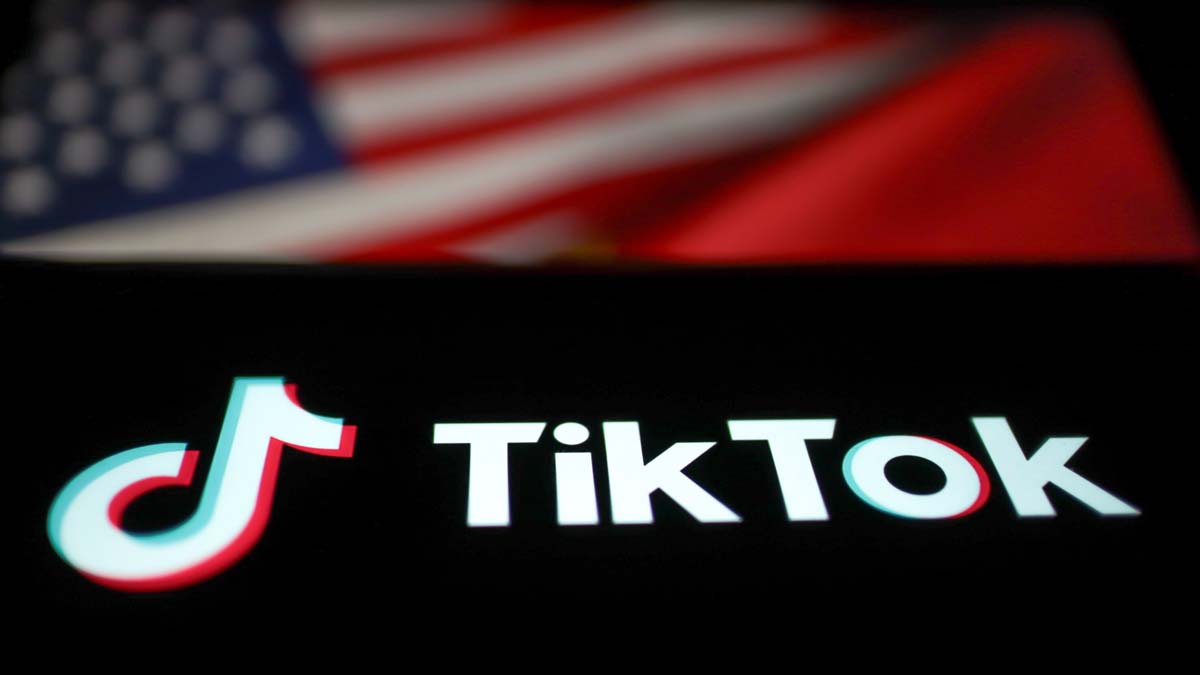
The Chinese Embassy has held meetings with congressional staff to lobby against the legislation that would force a sale of TikTok, according to two of the Capitol Hill staffers.
TikTok, which is owned by the Beijing-based company ByteDance, has repeatedly denied a relationship with the Chinese government and sought to distance itself from its Chinese origins. But now, with the fate of legislation to force the sale of the company facing an uncertain path forward in the Senate, the Chinese Embassy appears to be leveraging its political weight to protect the company’s future in the United States.
The meetings with Hill staff were initiated by the Chinese Embassy in outreach that did not initially mention TikTok, according to the congressional staffers, one of whom worked for the House and the other for the Senate, and who were granted anonymity to discuss conversations that they were not authorized to reveal publicly. The meetings, which took place with Chinese diplomats, were held after the House in March overwhelmingly voted in favor of the Protecting Americans from Foreign Adversary Controlled Applications Act, the legislation that would force ByteDance to sell TikTok.
Additionally, in a separate phone call to set up a meeting, an embassy official said that the Chinese ambassador was interested in discussing, among other matters, the House’s TikTok bill, according to a third staffer, a Democratic Senate aide who was approached.
The embassy downplayed the national security concerns with TikTok in both meetings, the two staffers said, and sought to align the app with American interests: In one meeting, the embassy said a ban on TikTok would harm U.S. investors who hold some ownership in ByteDance. In the other, the embassy emphasized that not all ByteDance board members were Chinese nationals.
The embassy also sought to claim the company as Chinese, the staffers said, despite TikTok’s public efforts to distance itself from the origin of its founders. TikTok, unlike ByteDance, is based in Singapore and the United States. In one of the meetings, the embassy argued that the legislation amounted to a forced data transfer of a Chinese company, according to the House staffer. In the other, the embassy argued that the effort was not fair to a Chinese company because the U.S. would not treat a company with a different national origin the same way, according to the Senate staffer.
TikTok said in a statement that the embassy meetings were “news to us, and it’s absurd to ask us to comment on anonymous sources we know nothing about.”
“Since the bill’s introduction, we’ve been publicly vocal about why we oppose the ban bill,” said Alex Haurek, a TikTok spokesperson. “This so-called reporting doesn’t pass the smell test and it’s irresponsible for Politico to print it.”
The Chinese Embassy, however, did not deny having held the meetings. In a statement, embassy spokesperson Liu Pengyu said that the “Chinese Embassy in the US tries to tell the truth about the TikTok issue to people from all walks of life in the US.”
“This is not about lobbying for a single company,” the spokesperson added, “but about whether all Chinese companies can be treated fairly.”
The statement went on to repeat some of the arguments that staffers said had been made at the meetings, including pushing back on national security concerns, and emphasizing international investment in ByteDance.
The statement also emphasized that although TikTok’s operation is legal, the United States “has tried every means to use state power to suppress it.”
TikTok has armed itself with dozens of lobbyists and spent millions of dollars to push back on the narrative around the company in Washington, where the app’s opponents have repeatedly argued that it’s a powerful tool for China to influence sentiment in the United States. The company has also spent millions on advertisements to rally public support against the legislation and leveraged its consumer base via push alerts that allowed the app’s users to easily call Congress. The conservative Club for Growth, the political kingmaking group funded in part by major ByteDance investor Jeff Yass, has also pushed lawmakers on the bill.
The broad efforts to sway congressional offices may ultimately prove successful, as the Senate remains at an impasse. Sen. Maria Cantwell (D-Wash.), chair of the Senate Commerce Committee, has been negotiating with other offices about the bill’s language, as part of an effort to solidify its legal standing. The House bill’s champion, Mike Gallagher (R-Wis.), chair of the Select Committee on the Chinese Communist Party, will leave the House this month. The forced sale of TikTok is expected to be included in a series of bills released by the House Speaker Mike Johnson on Wednesday around foreign aid and foreign adversaries.
Lobbying from diplomats is largely shrouded from public view, as they are not usually covered by the rules on transparency into foreign efforts to influence U.S. politics. The Foreign Agents Registration Act includes provisions that expressly exempt some embassy officials, said David Laufman, who previously oversaw enforcement of the foreign influence law at the Department of Justice.
“If there were other parties assisting them, like U.S. lobbying firms or strategic communications firms crafting message and preparing talking points, things like that, [those parties] might have registration risk,” said Laufman. “Embassy officials here would not.”
One of those staffers who attended the meetings with Chinese officials noted that the embassy had also previously tried to fight U.S. actions against another Chinese technology company, Huawei.
Publicly, China has also been critical of Congress’ actions on TikTok. In the wake of the House bill’s passage, China’s Ministry of Foreign Affairs said the legislation “puts the US on the wrong side of the principles of fair competition and international trade rules.”
Michael Sobolik, senior fellow in Indo-Pacific Studies at the American Foreign Policy Council, argued that the revelations of the embassy’s lobbying campaign underscored the need to separate TikTok from its Chinese parent.
“For once, Chinese diplomats have done America a favor,” said Sobolik, the author of a book on U.S.-China relations called “Countering China’s Great Game.” “By lobbying congressional staff to protect TikTok’s relationship with ByteDance, [People’s Republic of China] officials are revealing how valuable TikTok is to the Chinese Communist Party. Losing control of the app would neuter Beijing’s most potent weapon against Americans.”
News
What’s Inside the $95 Billion Package for Ukraine and Israel
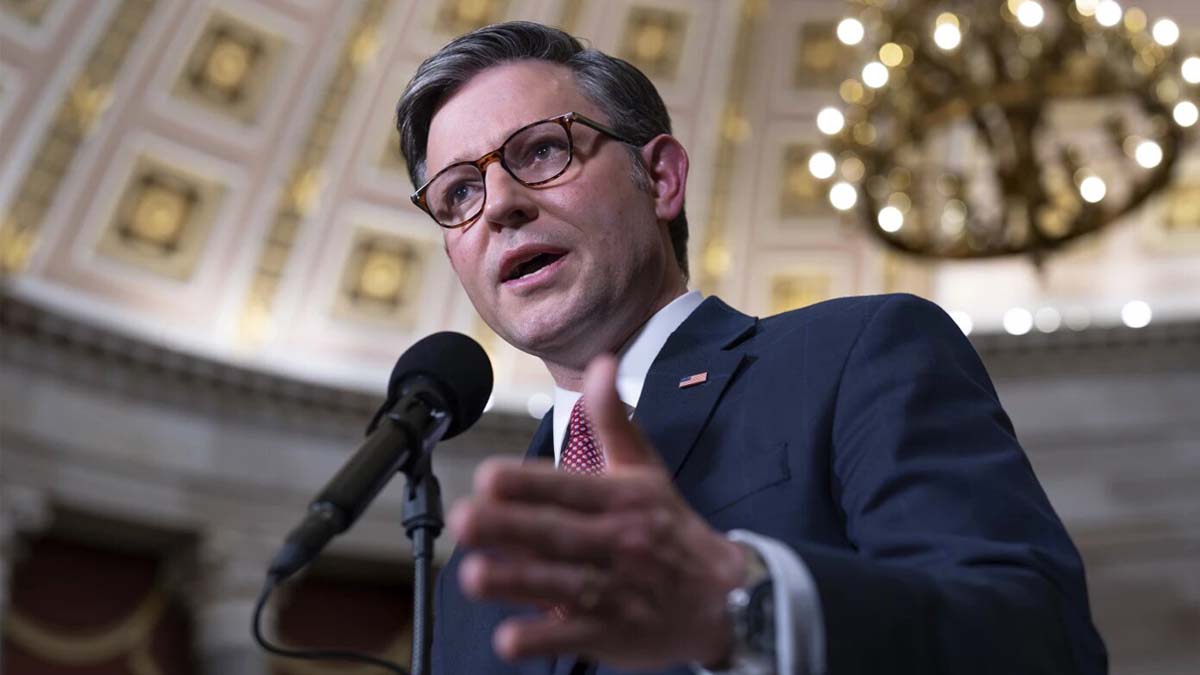
Speaker Mike Johnson has unveiled a long-awaited package of bills that will provide military aid to Ukraine and Israel, replenish U.S. weapons systems and give humanitarian assistance to civilians in Gaza.
The package totals $95.3 billion in spending, which matches the total that the Senate passed in mid-February. But there are also a few differences with the Senate bill designed to win over some House conservatives.
Here’s a look at what is in the bills that Johnson hopes to pass by this weekend.
UKRAINE
The aid to support Ukraine totals about $61 billion. Republicans on the House Appropriations Committee said that more than a third of that amount would be dedicated to replenishing weapons and ammunition systems for the U.S. military.
The overall amount of money provided to Ukraine for the purchase of weapons from the U.S. is roughly the same in the House and Senate bills — $13.8 billion.
The main difference between the two packages is that the House bill provides more than $9 billion in economic assistance to Ukraine in the form of “forgivable loans.” The Senate bill included no such provision seeking repayment.
The president would be authorized to set the terms of the loan to Ukraine and also be given the power to cancel it. Congress could override the cancellation but would have to generate enough votes to override a veto, a high bar considering how the two chambers are so evenly divided.
Johnson, as he seeks GOP support for the package, noted that former President Donald Trump has endorsed a “loan concept.”
He also noted that the House package includes a requirement for the Biden administration to provide a plan and a strategy to Congress for what it seeks to achieve in Ukraine. The plan would be required within 45 days of the bill being signed into law. House Republicans frequently complain that they have yet to see a strategy from Biden for winning the war.
The bill said the report from the administration must be a multiyear plan that spells out “specific and achievable objectives.” It also asked for an estimate of the resources required to achieve the U.S. objectives and a description of the national security implications if the objectives are not met.
ISRAEL
Aid in the legislation to support Israel and provide humanitarian relief to citizens of Gaza comes to more than $26 billion. The amount of money dedicated to replenishing Israel’s missile defense systems totals about $4 billion in the House and Senate bills. An additional $2.4 billion for current U.S. military operations in the regions is also the same in both bills.
Some conservatives have been critical of the aid for Gaza. At the end of the day, though, Johnson risked losing critical Democratic support for the package if Republicans had excluded it. The humanitarian assistance comes to more than $9 billion for Gaza, where millions of Palestinians face starvation, lack of clean water and disease outbreaks.
INDO-PACIFIC
The investments to counter China and ensure a strong deterrence in the region come to about $8 billion. The overall amount of money and the investments in the two bills is about the same with a quarter of funds used to replenish weapons and ammunition systems that had been provided to Taiwan.
News
High School Student Suspended for Saying “Illegal Alien” in Class

A North Carolina high school student has been suspended for using the phrase ‘illegal alien’ in class.
Christian McGhee, 16, was suspended for three days from Central Davidson High School, after using the term during a classroom discussion about word meanings.
Christian questioned the term ‘alien’ in an assignment, asking if it referred to ‘space aliens or illegal aliens without green cards,’ as reported by the Carolina Journal.
His comment reportedly offended another student who physically threatened McGhee, leading to the involvement of school authorities.
‘I didn’t make a statement directed towards anyone — I asked a question,’ Christian told the Carolina Journal.
‘I wasn’t speaking of Hispanics because everyone from other countries needs green cards, and the term ‘illegal alien’ is an actual term that I hear on the news and can find in the dictionary,’ he added.
His suspension could impact his chance of securing an athletic scholarship for college as he played on his school’s track and cross country teams.
His mother, Leah McGhee, said that despite their efforts, the assistant principal has been unwilling to remove the infraction from Christian’s record.
‘Because of his question, our son was disciplined and given THREE days OUT of school suspension for ‘racism,’ wrote Christian’s mother in the email, reported by the Carolina Journal.
‘Christian is devastated and concerned that the racism label on his school record will harm his future goal of receiving a track scholarship. We are concerned that he will fall behind in his classes due to being absent for three consecutive days.’
State Senator Steve Jarvis, representing Davidson County, has reached out to the school district’s superintendent, urging officials to look for the best outcome.
However, Jarvis refrained from taking a stance on the issue, and explained that he needed to understand all perspectives involved.
‘I do not see that that would be an offensive statement, just in getting clarification,’ he said. ‘But there again, I don’t know. I don’t know the situation of this particular incident.’
News
Speaker Johnson Moves on Foreign Aid. Possibly Triggering Vote to Oust Him.
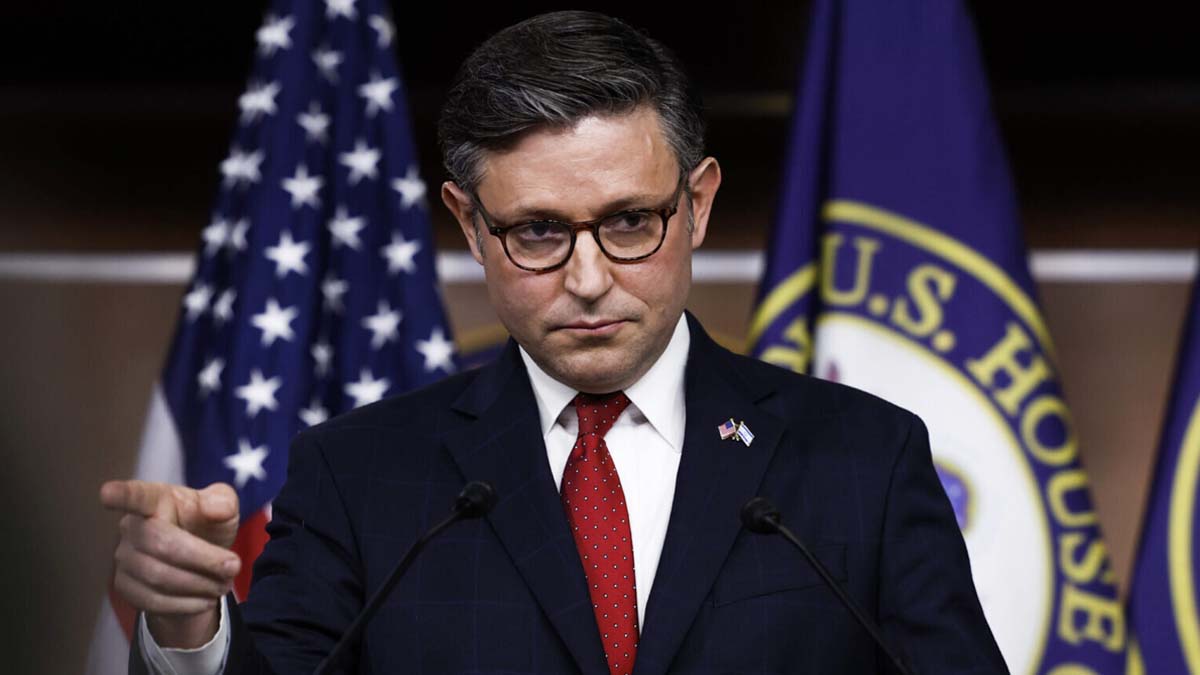
House Speaker Mike Johnson is moving ahead on a foreign aid plan that has roiled his conference and prompted two Republicans to push an effort to oust him from the chamber’s top job.
But instead of the complex four-part plan he floated this week, Johnson now intends to try to pass five bills — one each for aid to Ukraine, Israel, and Indo-Pacific allies — as well as a GOP wish list of foreign policy priorities and a fifth stand-alone bill to address widespread Republican demands to strengthen the southern U.S. border.
The new approach is risky and could blow up on the speaker, whose six-month-old hold on the gavel is being threatened by Rep. Marjorie Taylor Greene’s (Ga.) promise to move a motion to topple Johnson (R-La.) if he puts Ukraine aid on the floor, something many Republicans object to.
Johnson told Republicans in a text to colleagues Wednesday morning: “After significant Member feedback and discussion” this week, the House will move ahead with his plan, with some significant changes. He intends to release bill text on Ukraine, Israel and for Indo-Pacific allies earlier Wednesday, and language for the GOP wish list and border later Wednesday.
The three separate bills that fund military aid for Israel, Ukraine and Taiwan largely mirror the $95 billion Senate-passed supplemental. It turns a portion of the aid, the money sent directly to Ukraine, into a loan, which attempts to satisfy Republicans. It also includes just over $9 billion in humanitarian aid for Gaza, the West Bank, Ukraine and other places in need, which was a demand of Democrats.
Success is anything but guaranteed for Johnson, both on the foreign aid package and keeping his job. Timing on the votes, also, is up in the air — even as members were slated to head home for a one-week recess Thursday.
“The congressman has the flexibility to stay and support the aid package on Saturday,” his office said Wednesday.
The House Freedom Caucus has already panned the proposal. Johnson is “surrendering” on the border, the group tweeted in response to Johnson’s plan. “This flies in the face of every promise Republicans have told you” and they care more about “funding Ukraine than they do securing our own borders.”
Yet Johnson is moving the separate border package in an attempt to appease his unruly conference, many of whom have demanded that the border be secure before funding is sent to Ukraine and other allies.
Keeping border security separate from the foreign aid package is an attempt by Johnson to give both pieces of legislation a greater chance of passing. The national security bill will likely need Democratic support because of the large number of Republicans who don’t want to fund Ukraine — while Johnson aims to pass the border security bill with just Republican support, hoping to satisfy demands from all corners of his conference and send all bills to the Senate.
But in an almost four-hour meeting between Johnson and his allies Tuesday night — before this latest plan was released — Republicans left demoralized after failing to concoct a plan that would ensure enough of them support sending the package to the floor without having to rely on Democrats. Multiple people familiar with the meeting, who spoke on the condition of anonymity to discuss internal dynamics, said the meeting enlightened them and Johnson about what moving on his plan would mean for his future: It could al lead to his ouster.
“The battle lines were very clear at the end,” one Republican said. “It was very clear [the motion to vacate] will be brought if the speaker’s plan proceeds.”
Greene and Rep. Thomas Massie (R-Ky.) are supporting the motion to remove Johnson from the speakership after he relied on Democrats to pass several bills that failed to unite Republicans. If the motion were to be considered under special rules, the House would have 48 hours to vote on the question to oust the speaker.
News
NPR Whistleblower Uri Berliner Resigns
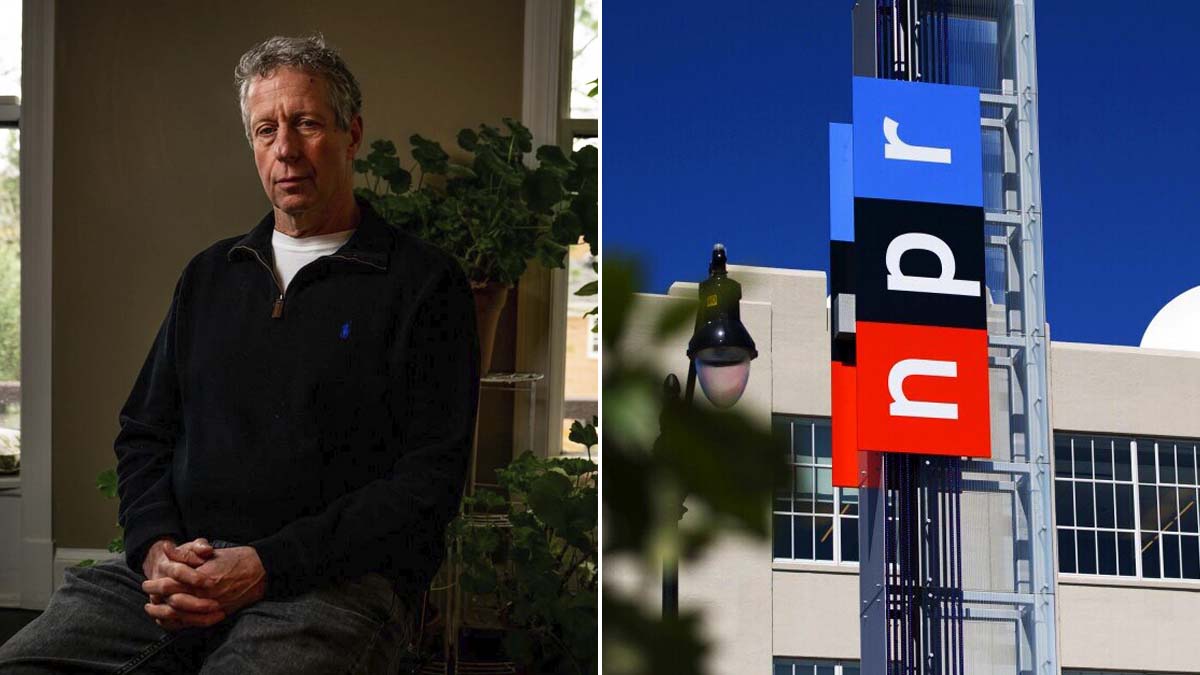
Longtime NPR editor Uri Berliner, who was suspended after blowing the whistle on liberal bias at the organization, announced Wednesday he has resigned.
“I am resigning from NPR, a great American institution where I have worked for 25 years. I don’t support calls to defund NPR. I respect the integrity of my colleagues and wish for NPR to thrive and do important journalism. But I cannot work in a newsroom where I am disparaged by a new CEO whose divisive views confirm the very problems at NPR I cited in my Free Press essay,” Berliner wrote in a statement published on X.
Berliner was referring to Katherine Maher, who took over last month as President and CEO and has gone viral for past social media posts showing far-left personal views.
Berliner recently penned a piece in the Free Press that criticized NPR’s coverage of Russiagate, the COVID lab leak theory, Hunter Biden’s scandalous laptop, embrace of the theory of systemic racism and accused the organization of downplaying antisemitism following Oct. 7.
Berliner also wrote that registration records in 2021 showed an astonishing disparity between Democrats and Republicans in the NPR newsroom in Washington, D.C., and that staffers were out to hurt the presidency of Donald Trump. Berliner, who said he voted against Trump twice, even said “one of NPR’s best and most fair-minded journalists” said it was good to not cover the Hunter Biden laptop story because it could benefit Trump in 2020.
His Free Press piece angered colleagues, with some telling in-house media reporter David Folkenflik they didn’t want to work with him any longer. Berliner was suspended for five days without pay and NPR told him it was a “final warning” and he would be shown the door if he violated NPR’s policy about working with outside news organizations going forward. Instead, he walked away on his own terms.
My resignation letter to NPR CEO @krmaher pic.twitter.com/0hafVbcZAK
— Uri Berliner (@uberliner) April 17, 2024
Berliner’s work has received a Peabody Award, a Loeb Award, Edward R. Murrow Award, and a Society of Professional Journalists New America Award, according to NPR’s website.
Many other NPR figures, including “Morning Edition” host Steve Inskeep, publicly rebuked Berliner’s conclusions.
Reached for comment on Berliner’s resignation, a spokesperson said, “NPR does not comment on individual personnel matters.”
An NPR spokesperson last week directed Fox News Digital to a memo to staff by editor-in-chief Edith Chapin, where she said she and her team “strongly disagree” with the veteran editor’s assessment of the quality of NPR’s journalism and integrity.
“We’re proud to stand behind the exceptional work that our desks and shows do to cover a wide range of challenging stories. We believe that inclusion — among our staff, with our sourcing, and in our overall coverage — is critical to telling the nuanced stories of this country and our world,” she wrote as part of a lengthy memo.
NPR has also stood by Maher, who showed support for Hillary Clinton and Joe Biden’s presidential runs while regularly sharing far-left talking points and criticizing Donald Trump on social media before landing the NPR top job.
“This is a bad faith attack that follows an established playbook, as online actors with explicit agendas work to discredit independent news organizations,” an NPR spokesperson told Fox News Digital of the newly surfaced posts.
News
Boeing Whistleblower Testifies
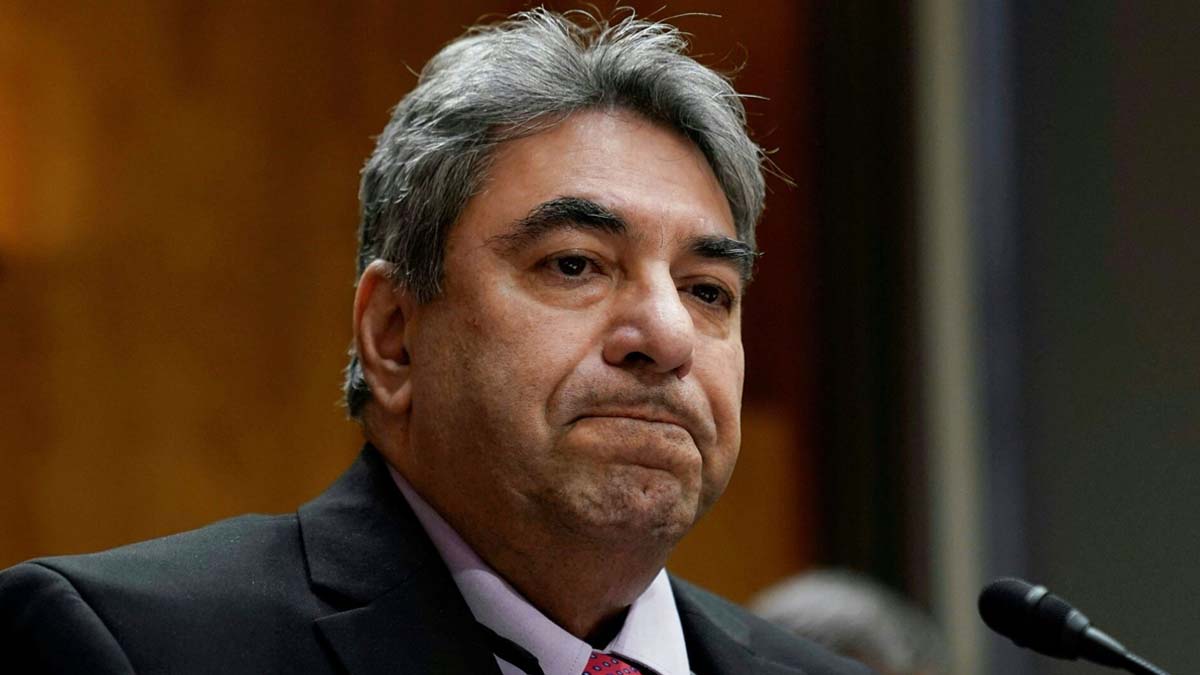
A Boeing whistleblower told a Congress hearing that he received threats against his life, while another said a probe into the door of an Alaskan Airlines flight that blew out was a ‘criminal cover up’.
Sam Salehpour and Ed Pierson were giving evidence to a hearing on Wednesday around the beleaguered company and their ongoing safety crisis.
Salehpour works as a Quality Engineer for the company, and claimed that sections of the 787 Dreamliner jets have not been properly secured.
While Pierson, Executive Director of The Foundation for Aviation Society and former Boeing manager, had previously warned of ‘chaotic manufacturing’ at the company.
During the hearing on Wednesday, it was revealed that Salehpour had faced threats from his supervisor after he attempted to discuss issues with the jets.
He also said that the safety situation at Boeing was like the company playing ‘Russian roulette’ with peoples lives, adding: ‘We never know exactly when it’s going to happen, when or where or how it’s going to happen.’
Pierson said in written testimony that he believes the investigation into the 737 Max that had its door blown out mid flight was being covered up.
Pierson said: ‘Last Wednesday, the NTSB Chair reiterated to Congress that Boeing has said there are no records documenting the work associated with the removal of the Alaska Airlines door.
‘In my opinion this is a criminal cover-up. Records do exist documenting in detail the hectic work done on the Alaska Airlines airplane and Boeing’s corporate leaders know it too.
‘They fought to withhold these same damning records after the two MAX crashes. I know this Alaska airplane documentation exists because I personally passed it to the FBI.’
While Salehpour told the hearing: ‘I have even been subjected to threats of violence from my supervisor after I attempted to discuss the problems in a meeting in April 9 2023.
‘After the meeting, my supervisor said to me, ‘I would have killed anyone who said what you said if it was from some other group, I would tear them apart.”
“I want to make clear that I have raised these issues over 3 years. I was ignored. I was told not to create delays. I was told, frankly, to shut up.”
WATCH: Boeing Whistleblower Sam Salehpour testifies Wednesday in front of Congress. pic.twitter.com/BSnkD6Itfq
— MSNBC (@MSNBC) April 17, 2024
He added: ‘I provided evidence of this threat as part of an ethics complaint, but no action has been taken and I continue to report to a supervisor who has threatened me with bodily injury for speaking out.’
He also added: ‘Boeing officials attempted to intimidate and retaliate against me by sidelining me from my job duties and excluding me from key meetings.’
As well as the threats being made against Salehpour, Senator Richard Blumenthal held up a picture of a large nail through a car tire.
Directing his questioning towards Salehpour, he said: ‘That bolt was inserted as a threat, perhaps as a risk to you.’
Salehpour explained: ‘I was losing air in my tire and I bring it to someone, they said you have a nail in the tire. That was about a one month old tire.
‘The gentleman told me it wasn’t picked up through normal driving. The nail was inserted in there, I believe it happened at work.’
Salehpour was questioned further on this, and asked by Senator Roger Marshall if he believed the tire incident and the threats was part of efforts by the company to silence and prevent him from sharing his story.
Salehpour said: ‘I think the retaliation was somebody calling me on my personal phone time after time. This is my personal phone.
‘My boss was calling me there for forty minutes, he berated me and chewed me out. I have a work phone that he could use but he called me on my personal phone.
‘It reminds me of people calling you on your personal phone to let you know they know where you live, they know where you are, and they can hurt you.
‘After the threats, and after this, it really scares me – believe me. But I am at peace.’
His lawyers say that Boeing has ignored his concerns and prevented him from talking to experts about fixing the problems.
On Tuesday night, Salehpour told NBC News that the jets should be grounded on account of ‘fatal flaws’ that could cause the plane to fall apart mid air.
When asked by the outlet if he would put his own family on a 787, he replied: ‘Right now, I would not.’
The Democrat who chairs the panel and its senior Republican have asked Boeing for troves of documents going back six years.
The lawmakers are seeking all records about manufacturing of Boeing 787 and 777 planes.
This will include any safety concerns or complaints raised by Boeing employees, contractors or airlines.
A Boeing spokesperson said the company is cooperating with the lawmakers’ inquiry and offered to provide documents and briefings.
The company says claims about the 787’s structural integrity are false. Two Boeing engineering execs said this week that in both design testing and inspections of planes – some of them 12 years old – there have been no findings of fatigue or cracking in the composite panels.
They suggested that the material, formed from carbon fibers and resin, is nearly impervious to fatigue that is a constant worry with aluminum fuselages.
The Boeing officials also dismissed another of Salehpour’s allegations: that he saw factory workers jumping on sections of fuselage on 777s to make them align.
Salehpour is the latest whistleblower to emerge with allegations about manufacturing problems at Boeing.
In March, whistleblower John Barnett was found dead in his truck in South Carolina while going throwing a whistleblowing suit against his former employer.
The 62-year-old alleged that under-pressure workers were deliberately fitting sub-standard parts to aircraft while on the assembly line.
Barnett had alleged that second-rate parts were literally removed from scrap bins, before being fitted to planes that were being built to prevent delays.
A 2017 review by the FAA upheld some of his concerns, requiring Boeing to take action.
He had just given a deposition to Boeing’s lawyers for the case the week before his death, his attorney Brian Knowles said.
Barnett’s job for 32 years was overseeing production standards for the firm’s planes – standards he said were not met during his four years at the then-new plant in Charleston from 2010 to 2014.
Barnett claimed he alerted superiors at the plant about his misgivings, but no action was ever taken. Boeing denied this, as well as his claims.
The company has been pushed into crisis mode since a door-plug panel blew off a 737 Max jetliners during an Alaska Airlines flight in January.
Investigators are focusing on four bolts that were removed and apparently not replaced during a repair job in Boeing´s factory.
The company faces a criminal investigation by the Justice Department and separate investigations by the FAA and the National Transportation Safety Board.
CEO David Calhoun, who will step down at the end of the year, has said many times that Boeing is taking steps to improve its manufacturing quality and safety culture.
He called the blowout on the Alaska jet a ‘watershed moment’ from which a better Boeing will emerge. There is plenty of skepticism about comments like that.
Senator Tammy Duckworth, member of the Senate Commerce Committee, said: ‘We need to look at what Boeing does, not just what it says it’s doing.’
The FAA is also likely to take some hits. Duckworth said that until recently, the agency ‘looked past far too many of Boeing´s repeated bad behaviors’.
In particularly when it certified the 737 Max nearly a decade ago. Two Max jets crashed in 2018 and 2019, killing 346 people, after faulty activations of a flight-control system that FAA did not fully understand.
The leaders of the Senate investigations subcommittee have also requested FAA documents about its oversight of Boeing.
The subcommittee’s hearing Wednesday will follow one by the Senate Commerce Committee, which is scheduled to hear from members of an expert panel that examined safety at Boeing.
The group said that despite improvements made after the Max crashes, Boeing’s safety culture remains flawed and employees who raise concerns could be subject to pressure and retaliation.
Boeing representatives will not testify at the hearing, but the company said it is cooperating with the inquiry.
‘We have offered to provide documents, testimony and technical briefings, and are in discussions with the Subcommittee regarding next steps,’ a spokesman said.
News
2019 Ukraine Impeachment “Whistleblower” Was a Biden Mole: Emails
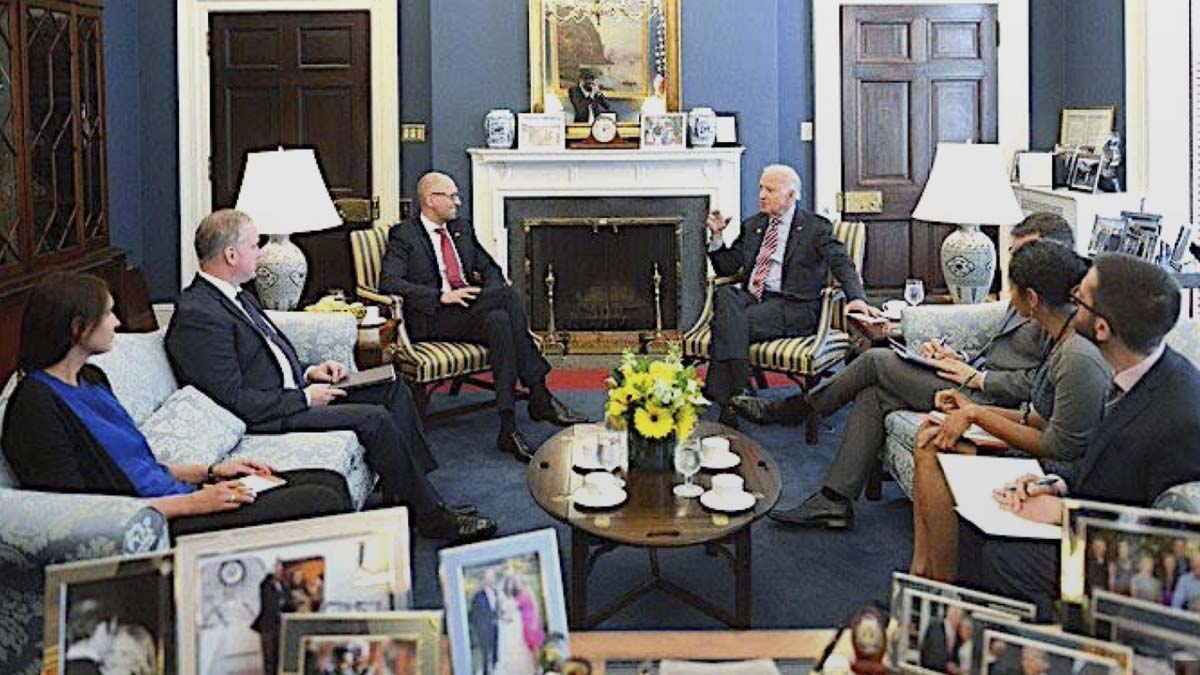
The ‘whistleblower’ who sparked Donald Trump’s first impeachment was deeply involved in the political maneuverings behind Biden-family business schemes in Ukraine that Trump wanted probed, newly obtained emails from former Vice President Joe Biden’s office reveal, RealClearInvestigations reported.
In 2019, then-National Intelligence Council analyst Eric Ciaramella touched off a political firestorm when he anonymously accused Trump of linking military aid for Ukraine to a demand for an investigation into alleged Biden corruption in that country.
But four years earlier, while working as a national security analyst attached to then-Vice President Joe Biden’s office, Ciaramella was a close adviser when Biden threatened to cut off U.S. aid to Ukraine unless it fired its top prosecutor, Viktor Shokin, who was investigating Ukraine-based Burisma Holdings. At the time, the corruption-riddled energy giant was paying Biden’s son Hunter millions of dollars.
Those payments – along with other evidence tying Joe Biden to his family’s business dealings – received little attention in 2019 as Ciaramella accused Trump of a corrupt quid pro quo. Neither did subsequent evidence indicating that Hunter Biden’s associates had identified Shokin as a “key target.” These matters are now part of the House impeachment inquiry into President Biden.
“It now seems there was material evidence that would have been used at the impeachment trial [to exonerate Trump],” said George Washington University law professor Jonathan Turley, who has testified as an expert witness in the ongoing Biden impeachment inquiry. “Trump was alleging there was a conflict of interest with the Bidens, and the evidence could have challenged Biden’s account and established his son’s interest in the Shokin firing.”
Ciaramella’s role – including high-level discussions with top Biden aides and Ukrainian prosecutors – is only now coming to light thanks to the recent release of White House emails and photos from the National Archives.
The emails show Ciaramella expressed shock – “Yikes” is what he wrote – at Biden’s move to withhold the $1 billion in aid from Kyiv, which represented a sudden shift in U.S. policy. They also show he was drawn into White House communications over how to control adverse publicity from Hunter taking a lucrative seat on Burisma’s board.
Yet there is no evidence Ciaramella raised alarms about the questionable Biden business activities he witnessed firsthand, which is in sharp contrast to 2019. In that instance, he was galvanized into action after being told by White House colleague Alexander Vindman of an “improper” phone call between President Trump and Ukrainian President Volodymyr Zelensky. During the call, Trump solicited Zelensky’s help in investigating Burisma and Hunter Biden’s role in the company.
Some former congressional investigators say Ciaramella effectively helped cover up a scandal far worse than what Trump was impeached over. What’s more, he failed to disclose that he had a potential conflict of interest stemming from his connection to the matter Trump asked Zelensky to probe when he lodged his complaint against Trump. RealClearInvestigations was the first to identify the then-33-year-old Ciaramella as the anonymous impeachment “whistleblower,” something major media continue to keep under tight wraps.
Ciaramella worked under CIA Director John Brennan when President Obama made Biden his point man on Ukraine in 2014, the same year Burisma hired Hunter. The next year, the CIA detailed Ciaramella, a longtime advocate for aid to Ukraine, to the White House, where he worked closely with Biden and his staff as a top adviser on key Ukrainian policies. After Biden left office, he stayed on at the GOP White House until mid-2017 even though he’s a Democrat, working as a Ukrainian and Russian analyst on Trump’s National Security Council. Co-workers there accused him of trying to sabotage Trump, including allegedly leaking sensitive information to the press.
RealClearInvestigations has reviewed more than 2,000 pages of newly disclosed archived emails from the former vice president’s office related to Ukraine, of which more than 160 contained references to Ciaramella. They reveal that his role advising Biden’s office potentially intersects with the current impeachment inquiry in several areas. Chiefly, Ciaramella focused on aid to Ukraine and anti-corruption reforms in the country. In that capacity, he:
- Hosted, cleared into the White House, and met face-to-face there with senior Ukrainian prosecutors.
- Gave a “readout” of the meeting to his superiors, who in turn pushed for Shokin’s firing.
- Traveled with Biden to Kyiv during the 2015 trip during which Biden demanded Shokin’s firing.
- Wrote media “talking points” for Ukrainian officials.
- Huddled with the top Biden officials involved in discussions concerning the $1 billion aid package and Shokin, including: Amos Hochstein; Victoria Nuland; Geoffrey
- Pyatt; Bridget Brink; and Michael Carpenter.
- Corresponded with Biden officials coordinating responses to negative media reports about Hunter’s cushy and controversial Burisma job.
Former Obama-Biden administration officials have confirmed in recent closed-door congressional testimony that Ciaramella was a key part of Biden’s process for making policy in Ukraine. In 2016, for instance, a White House photo shows him taking notes at a White House meeting Biden held with then-Ukrainian Prime Minister Arseniy Yatsenyuk to discuss Ukraine’s anti-corruption reforms and other issues.
Ciaramella also worked directly with top Obama and Biden administration diplomats on Ukraine, including senior State Department official Victoria Nuland. “Eric was regularly the clearing authority to get me into the White House for interagency meetings on Ukraine,” Nuland revealed in a 2020 Senate deposition. Asked if she ever discussed Ukraine policy and Shokin with Ciaramella, Nuland testified: “Of course, I did. He was part of the interagency process. He was also on my negotiating team for the six, seven rounds of negotiations I did with the Russians on [the disputed Ukraine region] Donbas.”
Ciaramella was directly involved in talks concerning the massive U.S. aid package to Ukraine that Biden conditioned on the removal of Shokin, who at the time had seized the assets of the corrupt Burisma oligarch employing Hunter Biden. He also arranged and participated in White House talks with Ukrainian prosecutors visiting from Shokin’s office.
White House visitor logs confirm Ciaramella escorted Shokin’s deputy prosecutor, David Sakvarelidze, into the White House for a January 2016 meeting. A White House agenda for the meeting lists Ciaramella as “point of contact” for the Ukrainian delegation. He also checked in Andriy Telizhenko, the Ukrainian Embassy official who says they discussed Burisma and Hunter Biden during the meeting and struggled to understand why his U.S. counterparts were suddenly hostile to Shokin after praising him in earlier talks.
Emails from the time show Ciaramella appeared surprised to hear about the linkage between the $1 billion loan to Ukraine and the dismissal of Shokin. Though Biden maintains he insisted Kyiv oust Shokin because he was too soft on weeding out fraud in entities that included Burisma, Ciaramella suggested he didn’t share the view that Shokin was corrupt. “We were super impressed with the group,” Ciaramella added, “and we had a two-hour discussion of their priorities and the obstacles they face.”
On Jan. 21, U.S. Ambassador to Ukraine Geoffrey Pyatt emailed Ciaramella and other White House aides an article from the Ukrainian press – “U.S. loan guarantee conditional on Shokin’s dismissal.”
“Yikes. I don’t recall this coming up in our meeting with them,” Ciaramella replied, referring to the White House meeting he hosted with top Ukrainian prosecutors.
News
Tucker Carlson Interviews Telegram Founder Pavel Durov

In an interview with Tucker Carlson, Pavel Durov, Russian-born Emirati–French entrepreneur and the founder of the popular instant messaging app Telegram, made shocking revelations about the U.S. government’s attempts to infiltrate the application widely known for its strong stance on user privacy.
Durov claimed that the FBI expressed interest in creating a ‘backdoor’ into the Telegram app, ostensibly to spy on users.
This, according to Durov, was a significant factor in his decision to reconsider establishing the company’s headquarters in San Francisco, opting for a global, decentralized approach to avoid U.S. government pressure.
“We received too much attention from the FBI, the security agencies, wherever we came to the US,” Durov recounted, noting how Biden’s FBI intensified their focus whenever his team was in the U.S.
“Last time I was in the U.S., I brought an engineer working for Telegram, and there was an attempt to secretly hire my engineer behind my back by cybersecurity officers,” he said.
Carlson pressed on, asking whether the U.S. government aimed to employ Durov’s engineer to crack Telegram or write code for them.
“They were trying to persuade him to use certain open-source tools that would be integrated into Telegram’s code, which, in my understanding, would serve as backdoors,” Durov said.
This revelation brings to light the U.S. government’s purported efforts to undermine the privacy and security that Telegram promises its users.
According to Durov, such a backdoor would not only enable the U.S. to spy on Telegram users but potentially other governments as well.
“FBI wanted to establish a relationship to control Telegram better. But for us, running a privacy-focused social media platform, that probably wasn’t the best environment to be in,” he said.
After the FBI’s interference, Durov abandoned the idea of establishing his company in San Francisco.
WATCH:
Telegram founder @durov explains to @TuckerCarlson how the US government tried to secretly hire his engineer to create “back doors” for officials to spy on users.
“For us running a privacy focused social media platform that probably wasn’t the best environment to be in.” pic.twitter.com/d8sFvmDuk4
— Tucker Carlson Network (@TCNetwork) April 16, 2024
Durov also told Tucker Carlson that he was contacted by the Democrats after January 6th because “they wanted the data of people who were demonstrating in Washington or wherever they were doing.”
“After the events of January 6th, we received a letter from, I believe, congressmen of the Democratic side. They requested we would share all the data we had in relation to what they called this “uprising.” We checked it with our lawyers, and they said, “You better ignore it.” But the letter seemed very serious, and the letter said, “If you fail to comply with this request, you will be in violation with the US Constitution,” or something like that,” Durov said.
He continued, “Two weeks after that letter, we got another letter, a new letter from the Republican side of the Congress. And there we read that if we give out any data according to the previous request, we would be in violation of the US Constitution. Constitution. We got two letters that said, Whatever we do, we’ll be violating the US Constitution in a way. That was my understanding of these letters.”
“The same way we respond to most such requests, we decided to ignore them because it’s such a complicated matter related to internal politics in the U.S.,” he said.
WATCH:
Telegram founder @durov tells @TuckerCarlson he was contacted after January 6th: “They wanted the data of people who were demonstrating.” pic.twitter.com/96pFYdAUyF
— Tucker Carlson Network (@TCNetwork) April 16, 2024
Durov emphasized his intention for Telegram to remain politically neutral. “We want the platform to remain neutral and not take any sides,” he said.
This stance, however, has not shielded the app from controversy. Telegram recently made headlines following the deadly Moscow terror attack, with investigations revealing that the attackers were recruited via the messaging platform.
Durov’s commitment to privacy has been a cornerstone of Telegram’s philosophy since its inception in 2013. Founded by Pavel and his brother Nikolai Durov, Telegram has soared in popularity, particularly in regions like Asia, Africa, and Europe, due to its strong encryption protocols and user-friendly design.
Telegram has gained significant traction as a privacy-centric platform, especially in regions where freedom of speech is under threat. The app’s rise in popularity was notably accelerated by the increased censorship and account bans on other social media platforms, like Instagram, Facebook, Twitter, and YouTube, for content that contradicted their narratives.
Watch the full interview:
Ep. 94 The social media app Telegram has over 900 million users around the world. Its founder Pavel Durov sat down with us at his offices in Dubai for his first on-camera interview in almost a decade. pic.twitter.com/NEb3KzWOg8
— Tucker Carlson (@TuckerCarlson) April 16, 2024
News
Iran President Warns of “Massive” Response If Israel Launches “Tiniest Invasion”

Iran’s president has warned that the “tiniest invasion” by Israel would bring a “massive and harsh” response, as the region braces for potential Israeli retaliation after Iran’s attack over the weekend.
President Ebrahim Raisi spoke Wednesday at an annual army parade that was relocated to a barracks north of the capital, Tehran, from its usual venue on a highway in the city’s southern outskirts.
Iranian authorities gave no explanation for its relocation, and state TV did not broadcast it live, as it has in previous years.
Iran launched hundreds of missiles and drones at Israel over the weekend in response to an apparent Israeli strike on Iran’s embassy compound in Syria on April 1 that killed 12 people, including two Iranian generals.
Israel, with help from the United States, the United Kingdom, neighboring Jordan and other nations, successfully intercepted nearly all the missiles and drones.
Tensions in the region have increased since the start of the latest Israel-Hamas war on Oct. 7, when Hamas and Islamic Jihad, two militant groups backed by Iran, carried out a cross-border attack that killed 1,200 people in Israel and kidnapped 250 others.
Israel responded with an offensive in Gaza that has caused widespread devastation and killed over 33,800 people, according to local health officials.
News
WATCH: Florida Police Have Zero Tolerance for Anti-Israel Activists Blocking Streets

A viral video from Monday showed Florida police taking immediate action when anti-Israel activists blocked city streets, placing them on their backs on the sidewalk.
WATCH:
In Florida, we drag these people out of the road and arrest them. pic.twitter.com/XU6ZUUf9xX
— Bryan Griffin (@BryanDGriffin) April 15, 2024
In 2021, Florida passed the “Combatting Violence, Disorder and Looting and Law Enforcement Protection Act,” championed by GOP governor Ron DeSantis, which states that it is a crime to willfully obstruct the public streets.
“Some of the crimes that may occur during a riot and are explicitly listed in the new legislation are: Willfully obstructing the free, convenient, and normal use of a public street, highway, or road by impeding, hindering, stifling, retarding, or restraining traffic or passage by standing on or remaining in the street, highway, or road, endangering the safe movement of vehicles or pedestrians,” WFLA reported in 2021.
The act states that it is a “3rd degree felony to obstruct traffic during an unpermitted protest, demonstration or violent or disorderly assembly; driver is NOT liable for injury or death caused if fleeing for safety from a mob.”
“In Florida, we are taking an unapologetic stand for the rule of law and public safety. We are holding those who incite violence in our communities accountable, supporting our law enforcement officers who risk their lives every day to keep us safe and protecting Floridians from the chaos of mob violence. We’re also putting an end to the bullying and intimidation tactics of the radical left by criminalizing doxing and requiring restitution for damaging memorials and monuments by rioters,” DeSantis stated in 2021.
In contrast to Florida, on Monday anti-Israel activists blocked the Golden Gate Bridge and parts of Interstate 880 in Oakland, California; all southbound lanes of Highway 101 were blocked at 7:30 a.m. The California Highway Patrol closed off the northbound lanes and stopped pedestrian and bicycle traffic across the bridge. The lanes didn’t open for almost five hours.
In lower Manhattan on Monday, anti-Israel activists stormed the Brooklyn Bridge, bringing traffic to a halt. Anti-Israel activists also blocked a road to arrivals and departures at Seattle-Tacoma International Airport in Washington.
News
VIDEO: Student Charged After Slapping Female Teacher in Profanity-Filled Classroom Tantrum
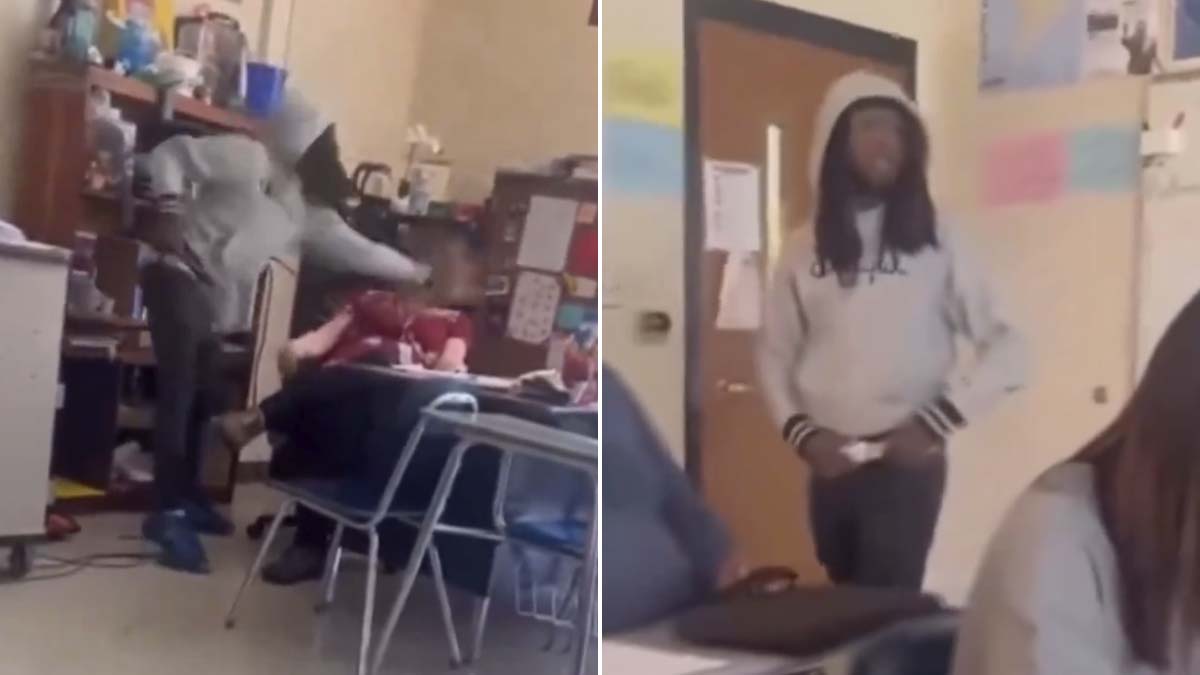
A North Carolina high school student was charged after he allegedly slapped his teacher multiple times during a viral profanity-laced classroom rant earlier this week.
The rage-filled youngster, identified only as a minor, confronted the educator inside Parkland High School in Winston-Salem, where he violently attacked her, according to video posted to social media.
After the initial impact, the teacher seemed unfazed by the slap as the student continued to run his mouth.
“Do you think that affected me anyway,” the unidentified teacher said, sitting back in her chair, legs crossed.
“Want me to hit you again,” the juvenile asked as he menacingly approached the teacher.
“I don’t want it,” the teacher answered before being hit again, this time from the right side.
The second blow knocks the sitting instructor’s glasses off her face.
“The f–k’s wrong with you, what you gonna do, still sit in that chair ’cause you a bitch. Ain’t nobody even coming, you got slapped,” says the student, seemingly singing and dancing.
“Bitch go back to teaching.”
Students behind the camera reacted to the slaps with laughter amid the classroom assault.
North Carolina HS student charged after slapping female teacher in profanity-filled classroom tantrum in front of laughing classmates pic.twitter.com/s4TKk3h6SN
— This Is Vani (@ThisThat14456) April 17, 2024
The school district condemned the student’s behavior.
“This behavior will not be tolerated. At no time is it acceptable for students to put their hands on a teacher in Winston-Salem/Forsyth County Schools,” Winston-Salem/Forsyth County Schools Superintendent Tricia McManus said, according to WXII.
“My focus now is on making sure that our teacher is taken care of and has the support needed to navigate through the lasting effects of this incident.”
On Tuesday, a secure custody order was issued for three misdemeanor charges against the student for assault on a government official.
He was charged with one count of communicating threats and two counts of misdemeanor assault, the Forsyth Sheriff’s Office announced.
“While we all agree that this incident was deplorable and outrageous to the community, and community organizations. All of us should be outraged when those who educate us can be assaulted,” Sheriff Bobby F. Kimbrough Jr. said.
“We should hold those who teach and educate our children to the highest regard. Our hope and our prayer at the FCSO is that we recognize that we as a community must bring order not only to our community but our children. We are praying for wholeness for those students who witnessed this and the educator involved.”
Parkland High School Principal Noel Keener warned the student would face disciplinary action along with the criminal charges.
Keener also reiterated that the behavior didn’t display the school’s expectations of its students.
“Please know this video is not reflective of our expectations of students at Parkland High School. We are working with district staff to address this immediately and ensure behavior like this is not tolerated in our school and district.”
Forsyth County District Attorney Jim O’Neil said within the hour it was posted, he was investigating the now-viral video for any criminal behavior.
“Both Sheriff Kimbrell and myself spent the morning at Parkland High School speaking with the teacher, because we want one message to be delivered today: ‘This isn’t about the color of your skin, this isn’t about your political affiliation, today is about one thing. Sending a message to the teachers out there, that law enforcement and the District Attorney’s Office support you, we care about the job you do.’”
“Nobody goes to work and expects to get assaulted.”
News
First 7 Jurors Sworn in for Trump Trial
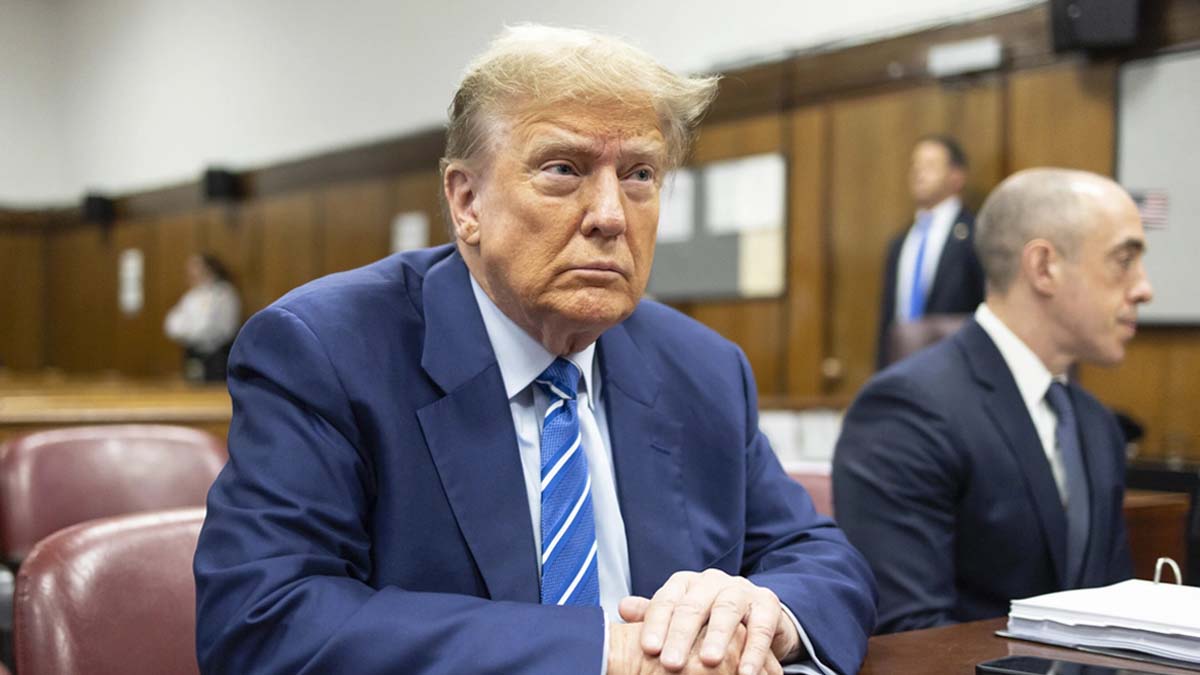
Seven New Yorkers have so far been picked to serve as jurors on former President Trump’s hush money trial, the first criminal case of any U.S. president in history.
The judge, along with prosecutors and Trump’s defense team, whittled down an initial group of 96 potential jurors starting Monday afternoon. They answered a questionnaire asking them about everything from where they lived to what news they consumed.
More than half of that initial group was immediately dismissed after raising their hands to indicate they could not be fair or impartial, in a show of the trial’s political divisiveness.
The jurors who serve on the trial are to be anonymous to the press and to the public, but general descriptions of each one are public, thanks to reporters posted up in and around the courtroom who witnessed the juror selection process.
There will be a total of 12 jurors picked, with at least six alternates to serve on the trial, which is expected to last six to eight weeks.
Here’s a look at who has been chosen to serve on the trial so far.
First juror, foreperson: A man who is originally from Ireland and now lives in West Harlem. He works in sales and gets his news from The New York Times, the Daily Mail, Fox News and MSNBC. He will serve as the foreperson.
Second juror: A woman who is a native New Yorker and has been an oncology nurse for 15 years. She spends her free time with family and friends and taking her dog to the park.
Third juror: A young to middle-aged Asian man who lives in Chelsea and grew up in Oregon. He is a corporate attorney.
Fourth juror: A middle-aged man born in Puerto Rico who has lived on the Lower East Side for more than 40 years. He told the court he has “no spare time” for hobbies and is self-employed. His wife is a writer and child works in sales and research.
Fifth juror: A younger Black woman and Harlem native who has taught English Language and Arts for eight years. She has never been married and has no children, and she said she considers herself a creative at heart.
Sixth juror: A Disney employee who was previously a student. She has three roommates and is unmarried without children.
Seventh juror: Lives on the Upper East Side but is originally from North Carolina. He is a civil litigator married with two children. He gets his news from The New York Times, The Wall Street Journal, New York Post, The Washington Post, WNYC and listens to podcasts “SmartLess” and “Car Talk.”
The court will reconvene Thursday to consider the selection of the remaining jurors. The judge indicated that process could wrap up by the end of this week.
He told the first set of jurors not to return until Monday, suggesting that day would be the start of opening statements.
News
House Sends Mayorkas Impeachment Articles to the Senate
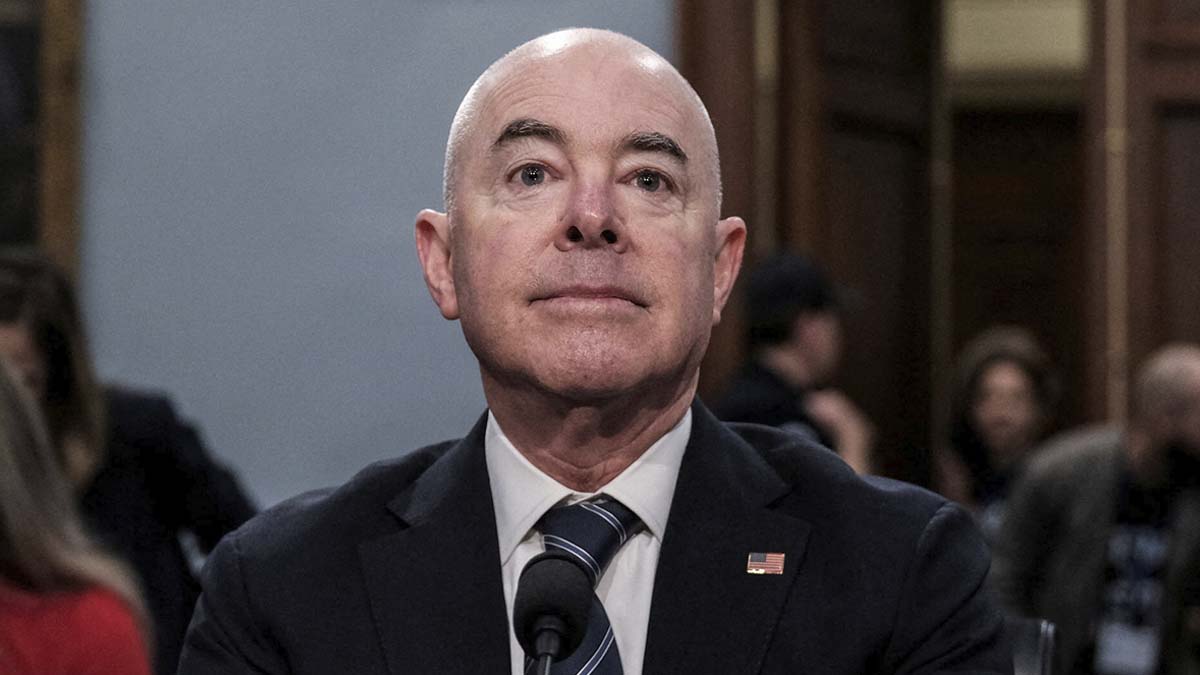
On Tuesday, the GOP-led House transmitted impeachment charges against Homeland Security Secretary Alejandro Mayorkas over his handling of the border crisis to the Democrat-controlled Senate.
The House managers tasked with prosecuting the case were introduced in the Senate chamber and Homeland Security Chairman Mark Green (R-TN), who is the lead manager, read aloud the text of the impeachment resolution.
WATCH: House impeachment managers deliver articles of impeachment against Homeland Security Secretary Alejandro Mayorkas to the U.S. Senate. pic.twitter.com/dNCsJ3Qgeu
— CSPAN (@cspan) April 16, 2024
A trial is expected to begin Wednesday at 1 p.m. ET with senators sworn in as jurors. Senate President Pro Tempore Patty Murray (D-WA) has been selected to preside over the proceedings.
GOP lawmakers are concerned that Democrats, who have long called the impeachment inquiry a “political stunt,” will try to cut short the process before a vote on whether to convict or acquit Mayorkas.
Majority Leader Chuck Schumer (D-NY) has so far not said whether there will be an effort to table or dismiss the impeachment charges.
Last week, after the House delayed the delivery of the articles, Schumer said the Senate is “ready to go whenever the House is. We want to address this issue as expeditiously as possible.” The top Democrat also said impeachment “should never be used to settle policy disagreements. That sets an awful precedent.”
House Republicans are “demanding” a full trial, Speaker Mike Johnson (R-LA) said in a post to X on Tuesday, adding that Mayorkas is the “worst” Cabinet secretary in U.S. history.
Forty-three GOP senators signed onto a letter sent to Schumer that called on the Senate to “uphold its constitutional responsibility to properly adjudicate” the impeachment articles. Minority Leader Mitch McConnell (R-KY) said he would “strenuously oppose any effort” to table the charges, noting the upper chamber has never agreed to do so in the past.
After months of investigation, the House narrowly passed two impeachment articles in February. They accuse Mayorkas of “willfully and systemically” refusing to comply with federal immigration laws and allege he “breached the public trust” with false statements and obstructing lawful oversight of the Department of Homeland Security (DHS).
Mayorkas has pushed back against what he called “false accusations” levied against him. A DHS spokesperson reacted to the successful House impeachment vote by saying, “House Republicans will be remembered by history for trampling on the Constitution for political gain rather than working to solve the serious challenges at our border.”
If a full trial does get held, a two-thirds vote will be required for a conviction, which would lead to removal from office. That appears unlikely, however, particularly given not every Republican senator appears to favor the impeachment effort.
The Senate currently has 49 Republicans, 48 Democrats, and three independents who caucus with the Democrats.
One GOP defector could be Sen. Mitt Romney (R-UT), who told Axios he does not “believe there’s a constitutional standard met.” Romney also said he would be “open” to tabling the impeachment articles if there is at least some debate on them.
News
Supreme Court Justices Skeptical of DOJ’s Expansive Jan. 6 Prosecutions

A majority of Supreme Court justices appeared skeptical Tuesday of the government’s broad reading of a statute used to charge hundreds of Jan. 6 defendants, as well as former President Donald trump.
Joseph Fischer, the defendant in the case Fischer v. United States, argued that the statute he was charged under, Section 1512(c)(2), was expanded beyond its intended purpose of targeting crimes of evidence tampering. Multiple conservative justices pressed Solicitor General Elizabeth Prelogar on whether the government’s interpretation of the statute, which enabled it to charge Fischer and others for obstructing Congress’ certification of the 2020 election, would sweep in a range of other protest activities.
“Would a sit in that disrupts a trial or access to a federal courthouse qualify?” Justice Neil Gorsuch asked. “Would a heckler in today’s audience qualify or at the State of the Union address?”
The statue threatens to levy up to 20 years in prison against anyone who corruptly “obstructs, influences, or impedes any official proceeding.”
The Supreme Court’s decision could impact not only hundreds of Jan. 6 defendants, but also Trump’s election interference case. Two of the charges in Special Counsel Jack Smith’s indictment of Trump center on the statute.
Smith’s indictment argued that Trump employed “knowingly false claims of election fraud to obstruct the federal government function by which those results are collected, counted, and certified.”
Multiple Jan. 6 defendants charged under Section 1512(c)(2) have already been granted early release in light of the Supreme Court taking up the case, including Kevin Seefried, Alexander Sheppard and Thomas B. Adams Jr., according to The Washington Post.
Gorsuch asked whether pulling a fire alarm before a vote would also qualify for 20 years in prison under the statute, a likely reference to Democratic New York Rep. Jamaal Bowman’s September decision to pull a fire alarm before a House vote on a GOP funding package to prevent a government shutdown.
Bowman pleaded guilty to a misdemeanor violation of D.C. code related to the offense in October.
Prelogar said “multiple elements of the statute” might not be satisfied by Gorsuch’s scenarios, noting the government would need to prove the defendant acted corruptly and with the intent of obstructing the proceeding.
Things aren’t going so well for Biden’s case in reference to Jan 6th. Justices Gorsuch & Alito just destroyed the entire foundation of Biden’s DOJ case against J6 protesters 🫤 Listen in….it’s beautiful.💯 pic.twitter.com/BY7L0sxGc6
— 🇺🇸The_Badged_Patriot🇺🇸 (@Badged_Patriot) April 16, 2024
Justice Samuel Alito similarly questioned whether the statute could be used to charge someone in the courtroom who shouted during oral arguments, delaying the proceeding by five minutes.
“We don’t think that 1512(c)2) two picks up minimal, de minimis minor interferences,” Prelogar said.
Of nearly 1,387 Jan. 6 defendants, over 353 have been charged with “corruptly obstructing, influencing, or impeding an official proceeding,” according to the DOJ.
Justice Clarence Thomas asked when the government has applied the statute to other protests in the past.
Preloager said the DOJ has not limited the statute’s use solely to crimes of evidence impairment, but noted she is not aware of a similar circumstance “ever happening prior to Jan. 6.”
Justice Amy Coney Barrett seemed amenable to a more middle of the road solution. Barrett questioned whether the statute could be used to charge defendants for trying to “obstruct the arrival of the certificates arriving to the Vice President’s desk for counting,” noting they would still be interfering with evidence in that hypothetical.
Justice Ketanji Brown Jackson likewise suggested the government may still be able to charge defendants if they limited the statute in this manner, clarifying that it applies to conduct that would obstruct an official proceeding “insofar as it is directed to preventing access to information or documents or records or things that the official proceeding will use.”
Justice Sonia Sotomayor and Elena Kagan appeared more sympathetic to the government’s position. Kagan noted there has never “been a situation like this with people attempting to stop a proceeding violently.”
“So I’m not sure what a lack of history proves,” she said.
News
Johnson Faces Growing Momentum to Oust Him as House Speaker
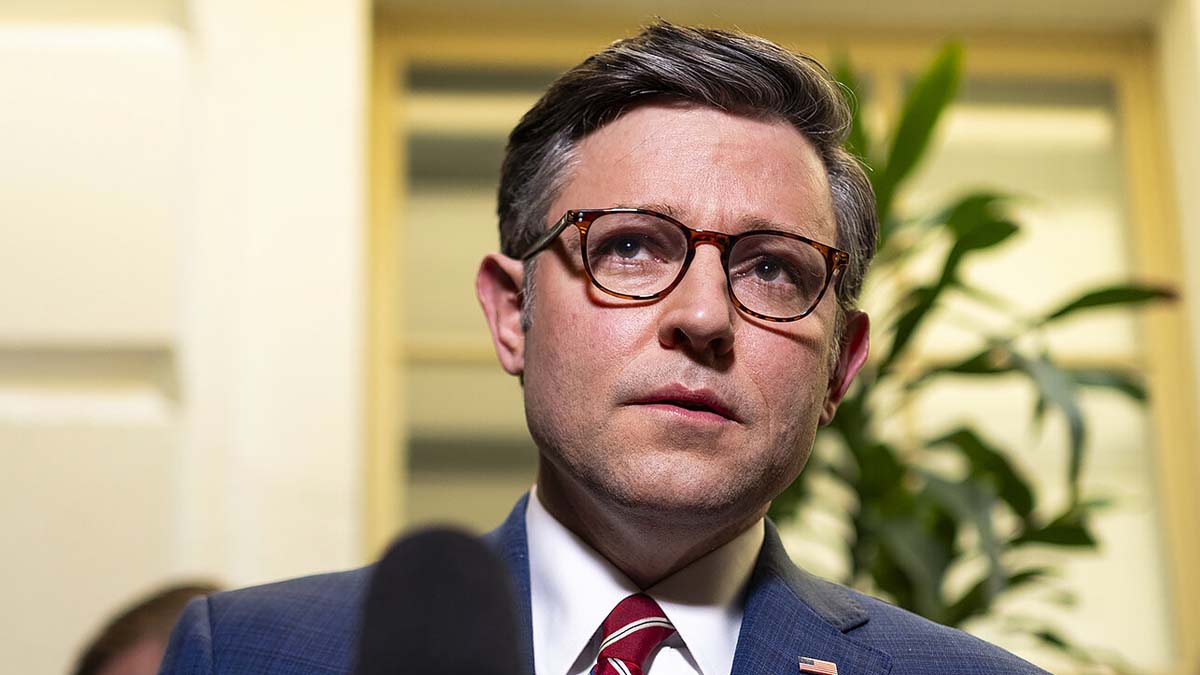
House Republicans’ dissatisfaction with Speaker Mike Johnson (R-LA) is rapidly growing as Reps. Scott Perry (R-PA) and Jim Banks (R-IN) are sharing their frustrations about what Banks called “insanity” in Johnson’s foreign aid framework, which includes over three times as much money for Ukraine as it does for Israel while neglecting the U.S. Southern border.
Perry took to X Tuesday to share an image of the framework, showing the bills allocate $48.83 billion to Ukraine, $14.1 billion for Israel, $2.4 billion for “Red Sea Operations,” $2.58 billion for “INDOPACOM,” and $3.3 billion for a “Submarine Industrial Base.”
Notice anything missing? @SpeakerJohnson failed to incorporate any border security into any of the FOUR of the bills he’s going to ram down our throats this week.
On more than half a dozen occasions in the last six months, he promised the American People this wouldn’t happen. pic.twitter.com/0QJJyw90hQ
— Rep. Scott Perry (@RepScottPerry) April 16, 2024
“Notice anything missing?” wrote Perry. Speaker Johnson “failed to incorporate any border security into any of the FOUR of the bills he’s going to ram down our throats this week.”
“On more than half a dozen occasions in the last six months, he promised the American People this wouldn’t happen,” Perry added.
Sharing Perry’s tweet, Banks called the package “Insanity,” emphasizing the plan would send three times as much money to Ukraine as it does Israel while simultaneously neglecting the U.S. Southern border.
Perry and Banks’ criticism of the four bills comes as Reps. Marjorie Taylor Greene (R-GA), who filed a motion to vacate against Johnson ahead of Easter break, and Andy Biggs (R-AZ) signaled opposition to the multiple-impact reentry vehicles rule (MIRV) that Johnson seeks to merge the bills.
“Israel funding should not be held hostage by Ukraine funding. The American people deserve to know where their senators stand on each funding component,” Biggs wrote in a post on X
“MIRV—the process used to merge the bills—is about as ridiculous as ranked choice voting. The least popular option is the one that wins,” he added.
Greene declared she would vote against the rule, and with just a one-seat majority and growing Republican opposition, Johnson would need help from Democrats to get the rule passed to unlock votes for the aid.
Meanwhile, Rep. Thomas Massie (R-KY) became a cosponsor of Greene’s motion to vacate the chair on Tuesday and urged the speaker to resign in the morning.
I just told Mike Johnson in conference that I’m cosponsoring the Motion to Vacate that was introduced by @RepMTG.
He should pre-announce his resignation (as Boehner did), so we can pick a new Speaker without ever being without a GOP Speaker.
— Thomas Massie (@RepThomasMassie) April 16, 2024
After Massie announced on X that he advised Johnson to resign and that he was behind Greene’s motion to vacate, American Tribune co-founder Jason Robertson asked Massie, “What was the straw that broke the Camel’s Back? FISA? Foreign War Funding? Spending more than Nancy Pelosi? All of the above?”
Whoa. What was the straw that broke the Camel’s Back?
FISA? Foreign War Funding? Spending more than Nancy Pelosi?
All of the above?
— Jason Robertson (@JRobFromMN) April 16, 2024
“All of the above,” Massie replied. “This camel has a pallet of bricks.”
However, a defiant Johnson declared he would not step down in the afternoon.
“I am not resigning, and it is, in my view, an absurd notion that someone would bring a vacate motion when we are simply here trying to do our jobs,” Johnson declared.
As Greene’s motion to vacate is not privileged, the House does not need to take it up immediately. Greene can make it privileged whenever she likes, which would force the House to consider it within two days.
-
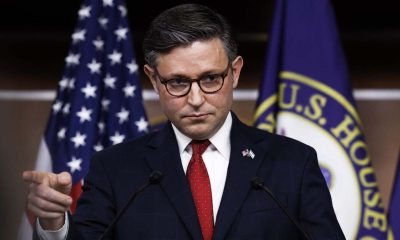

Speaker Johnson Moves on Foreign Aid. Possibly Triggering Vote to Oust Him.
13 hours ago • 3 min read • 44 Comments -


VIDEO: Student Charged After Slapping Female Teacher in Profanity-Filled Classroom Tantrum
13 hours ago • 2 min read • 25 Comments -


2019 Ukraine Impeachment “Whistleblower” Was a Biden Mole: Emails
13 hours ago • 5 min read • 3 Comments -


WATCH: Florida Police Have Zero Tolerance for Anti-Israel Activists Blocking Streets
13 hours ago • 2 min read • 12 Comments
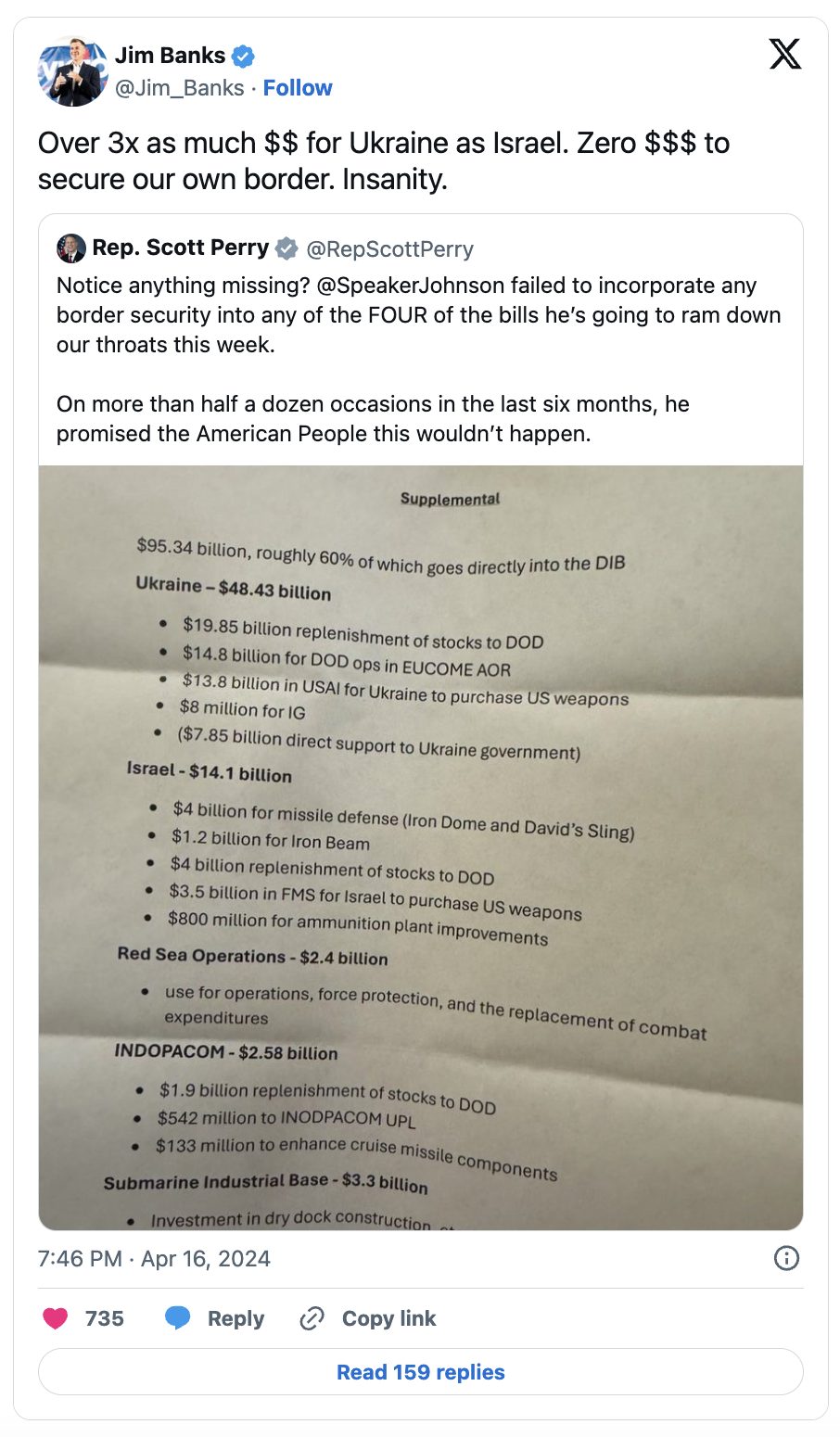


Not worth the price tag
Hey Kids! Be the first on your block to “tune out” of reality! Oh wait, you’re already doing that! What would you do if you walked into a houseful of morons wearing these things? Personally, I’d turn & run like Hell! STUPID!!!
Ahhh yes another way to control and a new way of indoctrinating our children to be mindless robots that obey the deep state terrorists. Ya …. Let’s see if that works on these stiff necked, stubborn children of GOD! NOT!
You kids are super quiet whilst checking out the latest Apple VR headset; you check on them & find as you remove the headset, their eyes are fried staring @ the content they were fixated upon as well as the “SUBLIMANAL messages that are wafting through the headset as well… lol